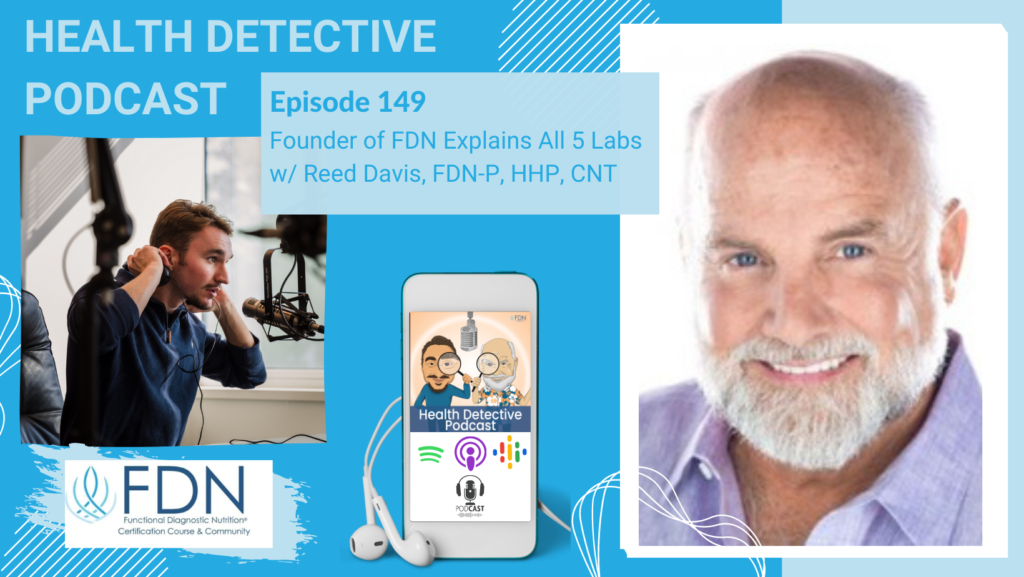Introduction
[00:00:00] Detective Ev: What is going on my friends? Welcome back to another episode of the Health Detective Podcast by Functional Diagnostic Nutrition. My name is Evan Transue, AKA Detective Ev. I will be your host for today’s show where we will be summarizing all five labs in the FDN system. I have the privilege of hosting none other than Reed Davis, founder of FDN, the man who needs no introduction. We did introduce him in episode 100, if you want to go back there and check out more about Reed.
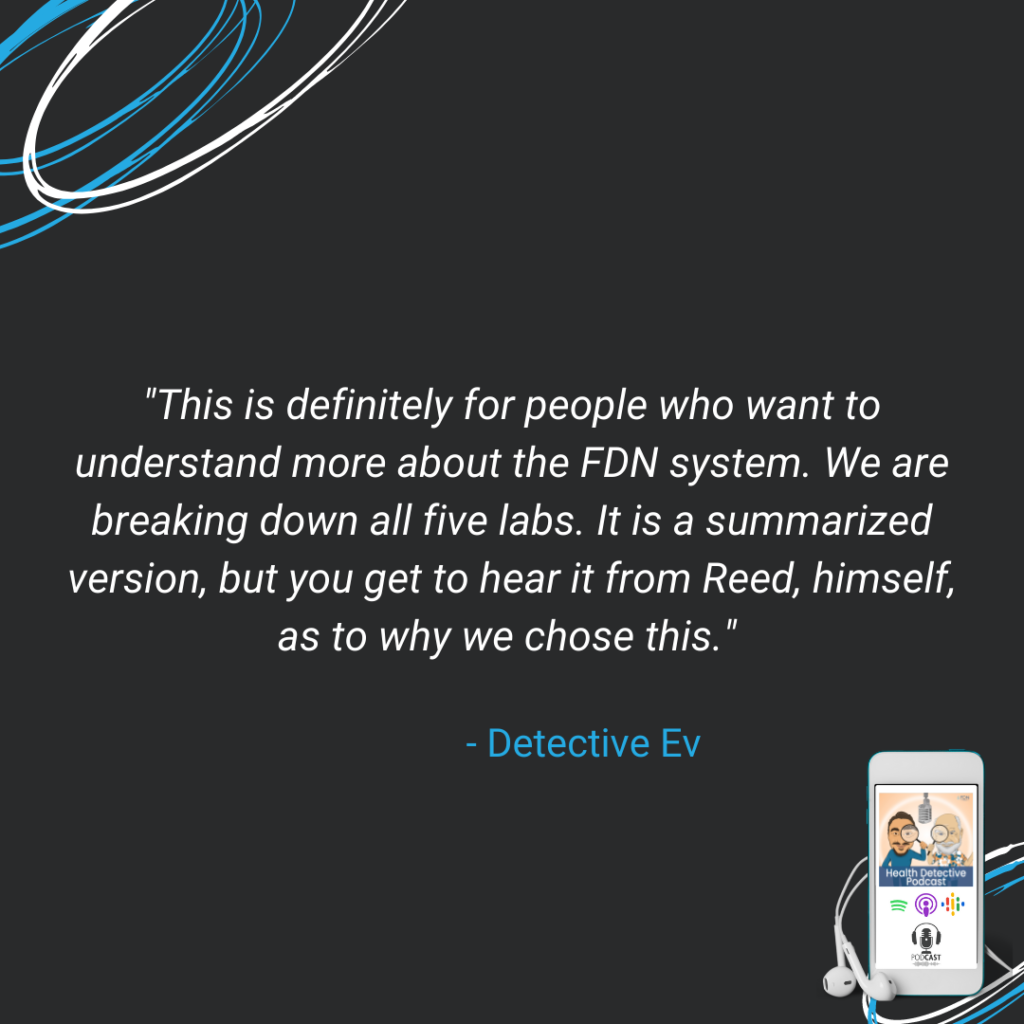
For today, we’re not really focusing on an intro. I actually want to keep this as short as possible because we have a lot of content to cover. This is definitely for people who want to understand more about the FDN system. We are breaking down all five labs. It is a summarized version, but you get to hear it from Reed, himself, as to why we chose this. There’s actually six tests, but there’s five labs. One is not a literal lab test. You’ll get to kind of learn what all of those are.
In addition, in the first part, you’ll be hearing about our Summer Open House. You can go to fdntraining.com/summer to learn more about this. There is a whole schedule on there. The reason that we’re doing this month of events, it’s June 2022, so depending on when you’re listening to this, unfortunately it might already be over.
Expanding the FDN Course Warrants Price Increase
Hopefully, you’re listening to this close to when this was released, and you have plenty of time to check these things out. We are doing events multiple times a week, all the month of June. That is because we have a thousand-dollar price increase coming on July 1st, 2022. This price increase, they happen occasionally once every year and a half, two years. It comes because the FDN course is constantly expanding.
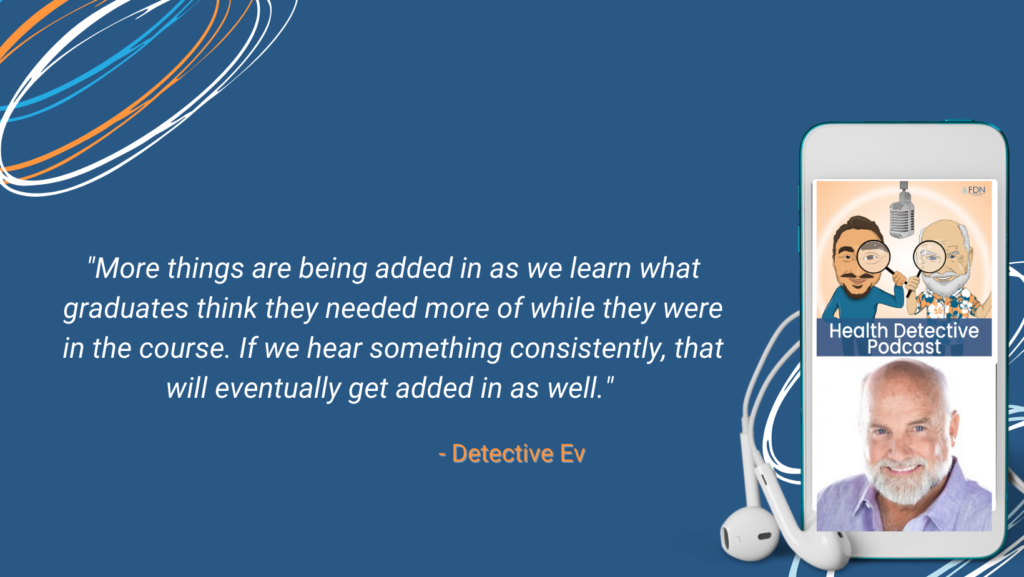
More things are being added in as we learn what graduates think they needed more of while they were in the course. If we hear something consistently, that will eventually get added in as well. That’s why the cost goes up, it is to match the increases in quality of the course over the last two years. And there’s a ton of stuff that’s been added in including, but not limited to, actual lab tests.
I got two lab tests when I went through the FDN course. Now you will get four and you’ll also get the one test that is not a lab test. So, check that out, fdntraining.com/summer, and you can get signed up for notifications for the events. You can also see a schedule on that page without signing up for anything.
What’s really interesting about this is in the five years I’ve been here, they have never done something where we’re literally showing you guys stuff that only graduates and or trainees typically get to see.
FDN Summer Open House – Exclusive Access Behind the Scenes
One of the things is the Trainee Study Hour. There’s actually two study hours every week where there are Live calls with either Reed, which again, the founder of FDN, or one of our awesome mentors, her name is Elizabeth. She is typically the one hosting the Wednesday show.
They will get on Live with you in the Facebook group for trainees only. You can ask questions, interact with other people in the group. It is very cool and just interesting that they do that twice a week. That was not something that was available when I was doing this.
Then as another example, you’ll get to see the Detective Hour. This is probably for the people who are a little more advanced already, maybe coming into this with some background in functional medicine. Now, again, you don’t need this for the course, but to check out that graduate only type of thing, it might make more sense because the people that are seeing Detective Hour, not only have they graduated FDN, they’re serious enough to join AFDNP, which is our professionals network.
Detective Hour is one of those things that is offered there. So, those are practitioner submitted cases about their clients. We block off the names and stuff. Then we do a Live walkthrough with one of our mentors, as well as Jennifer Woodward, who is the head of AFDNP.

They will actually go through and break down the client’s labs, give an extra interpretation. It gets pretty nerdy and pretty in-depth. If nothing else, check out those two things. There’s a bunch of other stuff going on, but again, you can go to that website. I don’t want to take up too much time with that. It is fdntraining.com/summer.
Choosing FDN Labs After Running Tens of Thousands of Labs
For now, I want to get to the interview. We’re going to break down the Open House. That’ll last about 15 to 17 minutes into the recording. Then the rest of the time is Reed and I talking about the labs, the FDN system, how and why it was created in the way that it was.
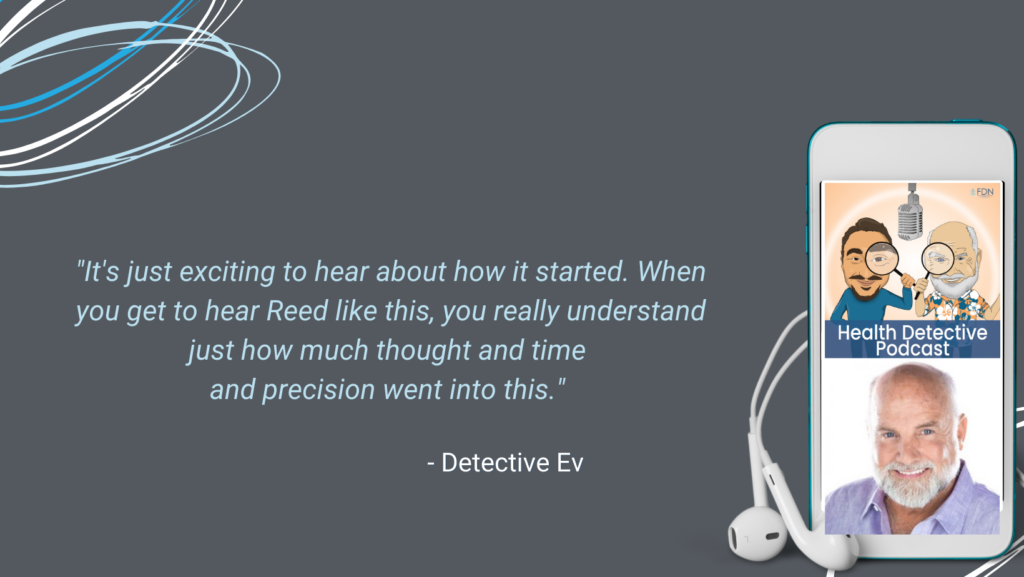
It’s going to be something that I think you’re going to love if you’re interested in FDN. Even if you’re a current trainee, I think it makes sense to listen to this as well. It’s just exciting to hear about how it started. When you get to hear Reed like this, you really understand just how much thought and time and precision went into this.
These aren’t chosen on a whim. It’s not random. It was done after tens of thousands of labs were run by him alone, then an additional, what has it been now – 13, 14 years of FDN existing as a course. So pretty cool. Without further ado, let’s get to the episode.
All right. Reed himself is on the podcast. How are you, my friend?
[00:04:52] Reed Davis: Fantastic, Ev! Thanks for having me on the show.
[00:04:55] Detective Ev: Absolutely. We talked to Reed a little bit after episode 100, because you were on with Jen Malecha. We’re glad to have you.
I mention you all the time on this show, typically once every other episode. But just for those that don’t know, in case you’re clicking on the first time, maybe you just saw this on the FDN website, Reed’s the actual founder of FDN. This is the person who created all this stuff.
Breaking Down the H.I.D.D.E.N. Acronym
I went through the program five years ago and graduated. So, yeah, there’s no better person to talk to when we’re lucky enough to have Reed on to figure out what we’re doing here. If you’re an active listener, you’ve heard parts about D.R.E.S.S. before, you’ve heard parts about H.I.D.D.E.N. stressors. You’ve heard some of the labs. I’m doing a whole series on the individual labs.
What we’re going to do today is get right to business. If you want to hear stories that Reed has, like incredible client testimonials, go all the way back to episode 100. We had a lot of fun with that episode. We did it live in San Diego. It was very cool. But today we’re focusing on, what is the FDN system in terms of the H.I.D.D.E.N. stuff, D.R.E.S.S., and the labs, because so many of you guys want to know that.

So, I’ll start it off. Let’s get started with the acronyms. I think H.I.D.D.E.N. is probably a good place to start. That stands for Hormonal, Immune, Digestion, Detoxification, Energy production, and Nervous systems. I know that’s a lot, but we’ll break that down for you guys. So, Reed, how did you come up with that acronym? Like why those things amongst the, you know, hundreds of systems in the body? How did you come to that conclusion?
Starting Off with H – Hormone
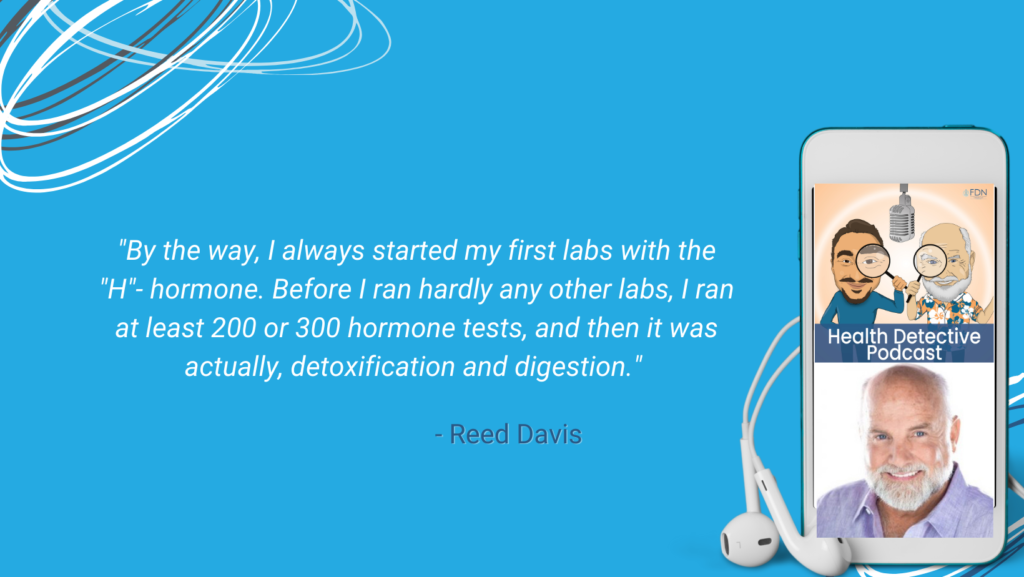
[00:06:14] Reed Davis: Well, those are the main ones that we were testing. I like making things easy to remember for myself as well as clients, and now of course, all the practitioners we have. Acronyms to me have always been a great way to do that. By the way, I always started my first labs with the “H”- hormone. Before I ran hardly any other labs, I ran at least 200 or 300 hormone tests, and then it was actually, detoxification and digestion.
Anyway, I needed a nice, easy way for everyone to remember it, Ev.
[00:06:46] Detective Ev: Yeah, well and fair enough. Clearly it works because I still remember it five years later. I always get so nervous that when I’m live on a podcast or in person, I’m going to forget the last one, you know? But for those that didn’t get to hear that episode 100, we’ll give you the brief context.
Reed has run thousands and thousands of labs. You even said this yourself and I appreciated your honesty, like in the beginning, because there wasn’t tons of functional practitioners out there, there wasn’t all this information. This is 20 years ago, you’re starting this. You had to do a lot of experimentation and see, what works here? What works with that?
Then over time, it kind of blossomed into this system that is very predictable. We can kind of see, okay, if you run all these labs on these people, you’re never going to get someone worse, that’s for sure. Some people might need a little more, some people might not even need it that much. And as you always say, you never really know which lab sometimes had the best effect. But this is why we need all of them.
Running All 5 Labs Gives More Tools to Work With
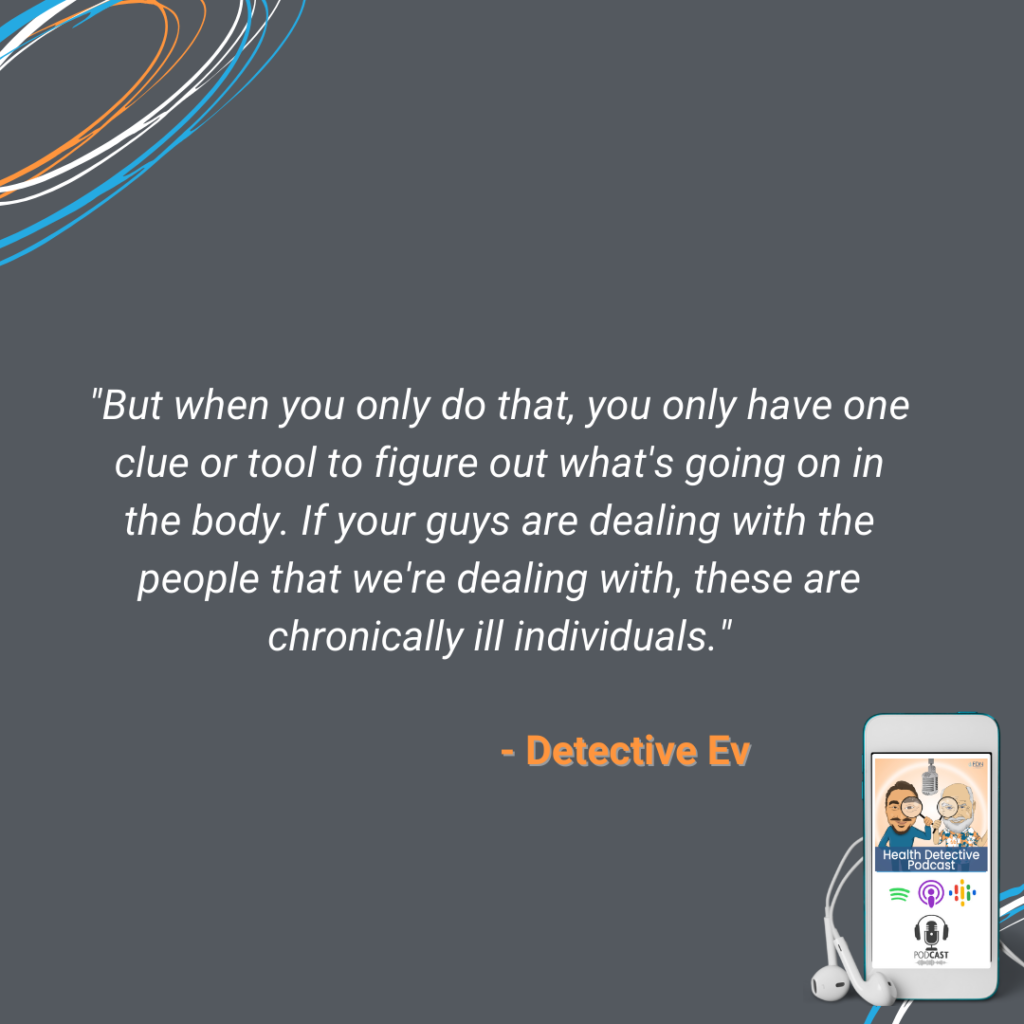
Everyone in this point, that’s listening, has seen a practitioner that only runs gut tests or only runs food sensitivity tests. They’re great things. We run them ourselves. But when you only do that, you only have one clue or tool to figure out what’s going on in the body. If your guys are dealing with the people that we’re dealing with, these are chronically ill individuals. Chances are, it’s not just going to be one thing. Their whole body probably has a lot of stuff going on.
Their hormones are going to be out of whack. They’ve probably acquired a few gut pathogens that are now overgrowing. They certainly have food sensitivities. That’s going to be par for the course, right? I mean, no one really escapes that, it seems.
So, you started with the hormone and kind of the detoxification stuff. What came next into the system? What was the next logical thing?
[00:08:22] Reed Davis: Well, digestion. Because I, not being a doctor, is another important aspect to this that I couldn’t diagnose one thing, one particular thing.
By the way, everyone walking in our door 23 years ago, when I started, had already seen five or eight practitioners, you know. They’d been through what we call now, the cycle of trial and error. You’re very familiar with that. We can do a whole show on that. So, people have already been to a practitioner where they use what I call the “sounds like” method.
Using the “Sounds Like” Method Doesn’t Work
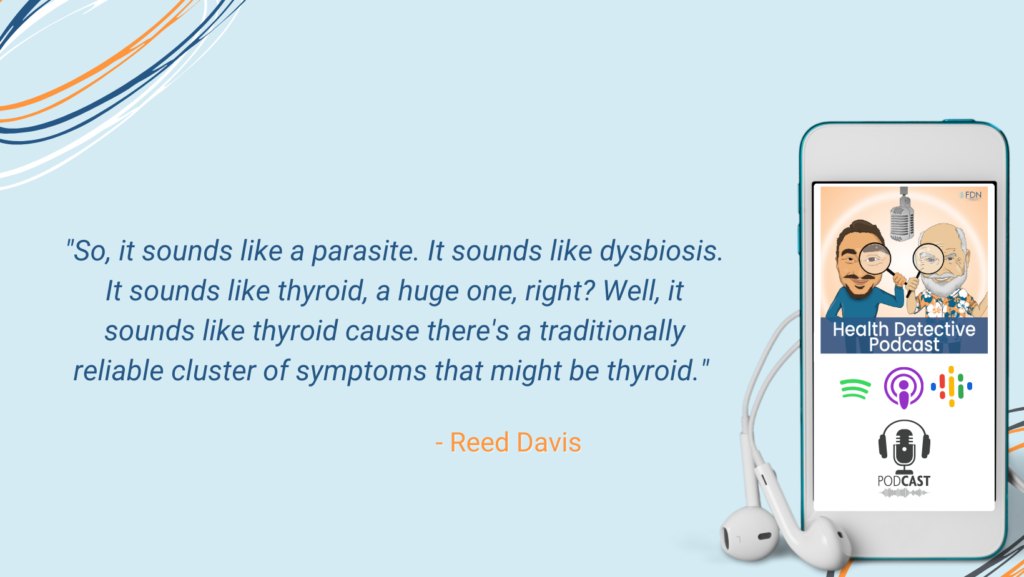
You have a shirt on that says, test and don’t guess, but that’s exactly how physicians are trained – to guess what test to run. So, it sounds like a parasite. It sounds like dysbiosis. It sounds like thyroid, a huge one, right? Well, it sounds like thyroid cause there’s a traditionally reliable cluster of symptoms that might be thyroid.
You test the thyroid, yep, pat myself on the back. Found your problem, here’s your prescription. You know, we’re just treating the paper. So, we know from our studies of anatomy, physiology, and biochemistry, it could be a hundred different things causing that. So, why just test it? Oh, it sounds like thyroid, test the thyroid.
Shame on you if you say that’s all there is wrong with a person. Oh, I found your problem. And then you treat the thyroid, or they treat the test results. Let’s get those test results in range, you know, get those numbers up or down, whatever it has to be. That system doesn’t work. I know your question was, which was the next lab, but it wouldn’t have mattered. I would have had to discover them all eventually anyway.
Because, if you help 300 or 500 people with their hormones, guess what? They also have digestive issues. They also have detoxification issues. They also have energy production and on and on. The whole H.I.D.D.E.N. is always, there’s always something to improve in those six areas, no matter what.
Okay. So, why would I, as not a physician, I don’t want to diagnose and treat one thing. I don’t want to fractionate the body. I want to help that entire person heal. And so that’s why it took 10 years to figure it all out.
Running 10,000 Labs Helps Make Some Observations
[00:10:34] Detective Ev: Yeah. Well, you kind of already got to my next question because I was going to be like how did we come up with the specific labs or all that stuff? Like how did this actually manifest? Because I know it started out with a little trial and error in the beginning. But like, why do we always use five, six labs? Why does it have to be that way? And you just answered that.
[00:10:50] Reed Davis: I got to tell you, I had good mentorship. There was guys like Dr. Bill Timmins, creating this lab work. He broke off from what he was doing because he invented labs. He came up with, this is what we should be running to get to the underlying causes and conditions. He was one guy that I learned a lot from. Dr. Bill Bailey’s another. There’s many, too many to mention.
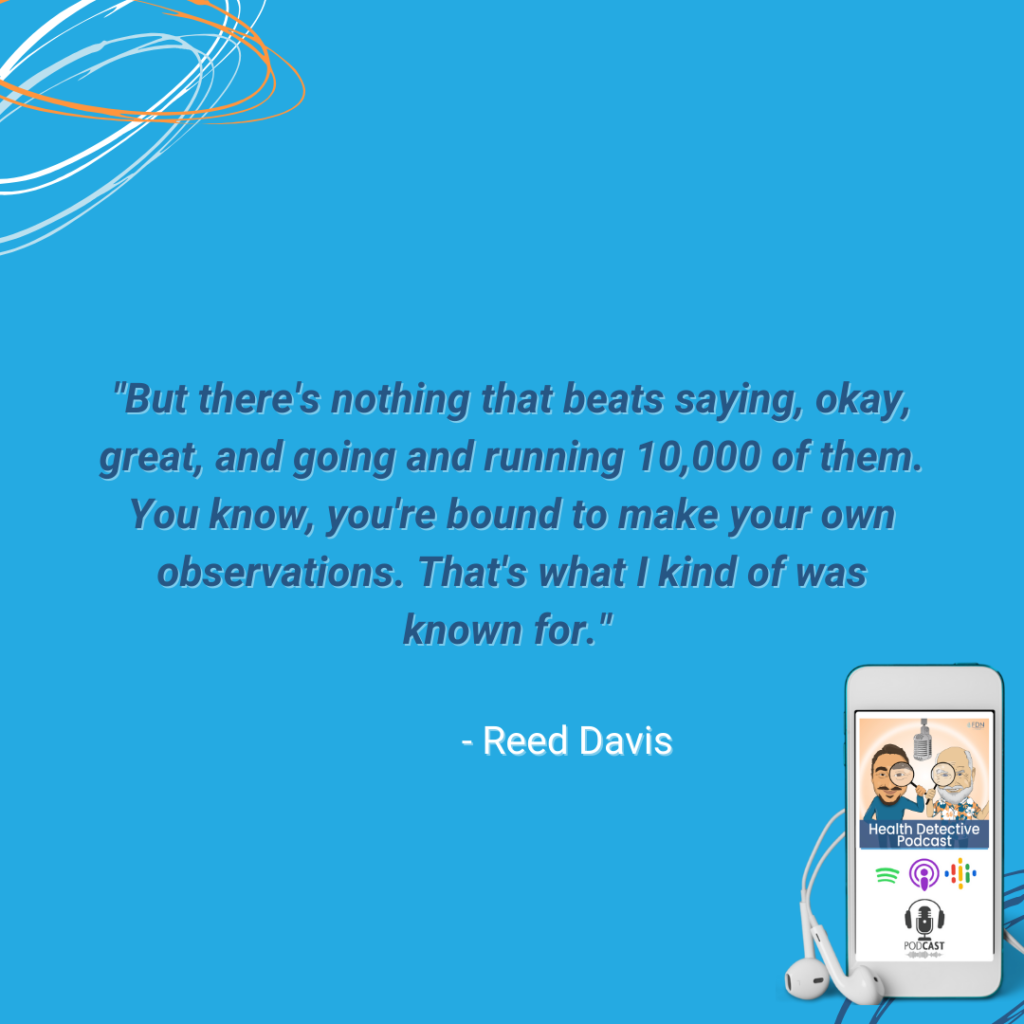
But there’s nothing that beats saying, okay, great, and going and running 10,000 of them. You know, you’re bound to make your own observations. That’s what I kind of was known for. Good mentorship. Good lab work. Very cutting edge, very alternative at the time.
You know, you hadn’t really heard much about complimentary medicine or integrative medicine. Functional medicine had never left anyone’s mouth way back then. It became functional medicine eventually and thank goodness.
But still, just that sheer experience, again, good mentorship. I was recognizing patterns, and all these, was mostly women at first.
Clients Wanting to Run All 5 Labs
They came in for their hormones, stress, hormones, stress hormones. That was my niche, if you will. But then guess what? They had all those other problems and I slowly figured it out. Matter of fact, I used to run the labs individually. Like first we’re going to do hormones, and maybe digestion. Then we’re going to look at immune system, detoxification, energy production, autonomic balancing.
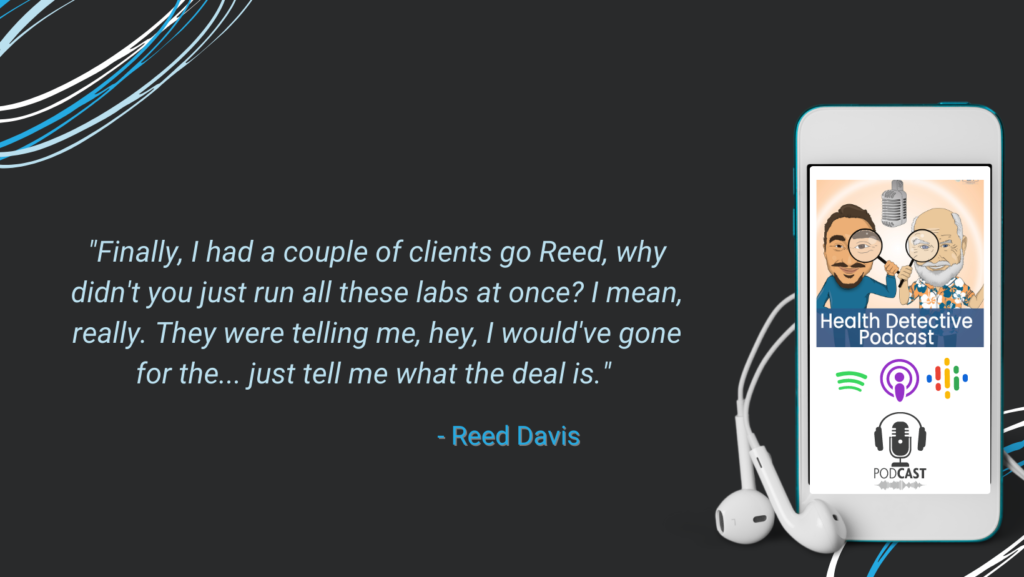
Finally, I had a couple of clients go Reed, why didn’t you just run all these labs at once? I mean, really. They were telling me, hey, I would’ve gone for the… just tell me what the deal is. See, I was in our office, we were kind of working that way of stretching it out a bit. Plus, you know, I was concerned about their budget, spending money on all these labs at once.
It just wasn’t being done at the time, or at least not by me. So, I just, eventually, one day got sick and tired of piecemealing it out, and figuring this, then you add that, and then you had this. I just decided our program was going to be, you run five labs, or we can’t help you. You’re going to have to run them eventually. You might as well run them all right now.
[00:12:59] Detective Ev: I was going to say from experience, I’ve said this before. I think I said it in episode 100, learn from me too. I had limiting beliefs when I started. I went through the system, it worked tremendously for me. And I still had that.
Serving At the Highest Level by Running All 5 Labs
This is a personal development thing as much as it is a health thing, let’s be honest. Because I didn’t believe I could make someone run five labs or use this on themselves. I’m like, oh, I can’t ask for that. But it’s just what you said. I ended up not serving them at the highest level.

They would have been happier if I just ran all the labs, because that was the system I was taught. That’s what I know works. You didn’t teach in the course, hey yeah, you run a gut test and hope for the best. You said, this is what we use altogether. It’s kind of ironic that we do that.
There’s so many trainees still to this day, thankfully less and less because of the support we have, but so many that limit those beliefs on themselves. They’re like, well, okay, I’ll just go out and run one. It’s like, that’s not what you were taught. That’s not what worked for you. So, we’re doing a disservice to those people.
Most of the people that come to us, I know I speak for myself, I was so sick, I would have paid any amount of money if it worked, and FDN works. Again, you’re not going to get the person worse, that’s for sure. I always say this last thing I’ll mention here. My mom and dad ended up spending, they told me, eventually, a little over a hundred thousand dollars on Western medicine, Reed, just on the stuff there.
The Running One Test & Finding Nothing Disaster
My parents did not have a hundred thousand dollars. They work hard, I’m not discrediting them. Most people don’t have a hundred thousand dollars to be blown on this stuff. Then she finally worked with an FDN, who’s Jenn Malecha. That was the best $5,000 she ever spent. That was a long program too, it was like a nine-month thing.
I want to go back for just a moment though, if I can, to your thyroid example. Because I think what you said about the thyroid thing and the doctor saying, it sounds like that, and I’ll run it, was actually the best-case scenario. And it’s perfect proof of why we need all these labs. Because what you said is like, they say, it sounds like thyroid. They run it and they find something with the thyroid. As you and I both know, that’s the best case.
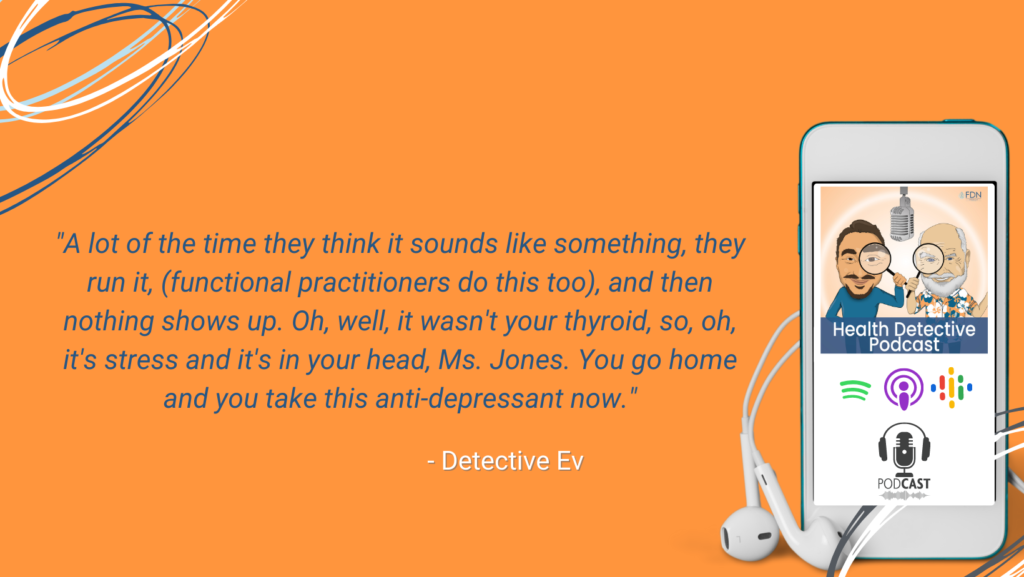
A lot of the time they think it sounds like something, they run it, (functional practitioners do this too), and then nothing shows up. Oh, well, it wasn’t your thyroid, so, oh, it’s stress and it’s in your head, Ms. Jones. You go home and you take this anti-depressant now. And guys that’s, you know, it’s a pun in a sense, but it’s really not funny because that’s really what happens. If they can’t figure it out, you’re on an anti-depressant now or something similar. That’s not okay. We can’t be doing that.
Dr. Kyrin Dunstan, who Reed just did a huge Live with, we had her on the show. She is an OB/GYN that turned very functional. She had that same thing in her head. Remember what she said, Reed. It sounded like a thyroid problem to her, so she runs the thyroid tests on herself.
Interviewing Potential Clients to See If We Can Help Them
Just because she was only running TSH, it came back what? “Normal” quote/unquote. So, she wasn’t able to find it. That’s why we can’t just play this guessing game. You use the test, it’s a proven system. Is it going to be perfect for everyone right off the bat? No. You are going to improve people about 70%, 80% in the first, like 90 days. I have seen that consistently, very consistently.
[00:15:54] Reed Davis: Well, it’s very reliable. Plus, you know, our onboarding sessions, we work for people that A, we know it can help. We interview people. They call us up all excited because we were referred by someone that we helped a lot. You helped my friend so-and-so; I need you to help me too. They want to start telling you their life story.
We’re like, well, hey, let’s just take a second and decide, can we help you? We go through a list of questions that determines A; can we help you? And then B; are you someone that we are compatible with, that we can work with, that we want to help you?
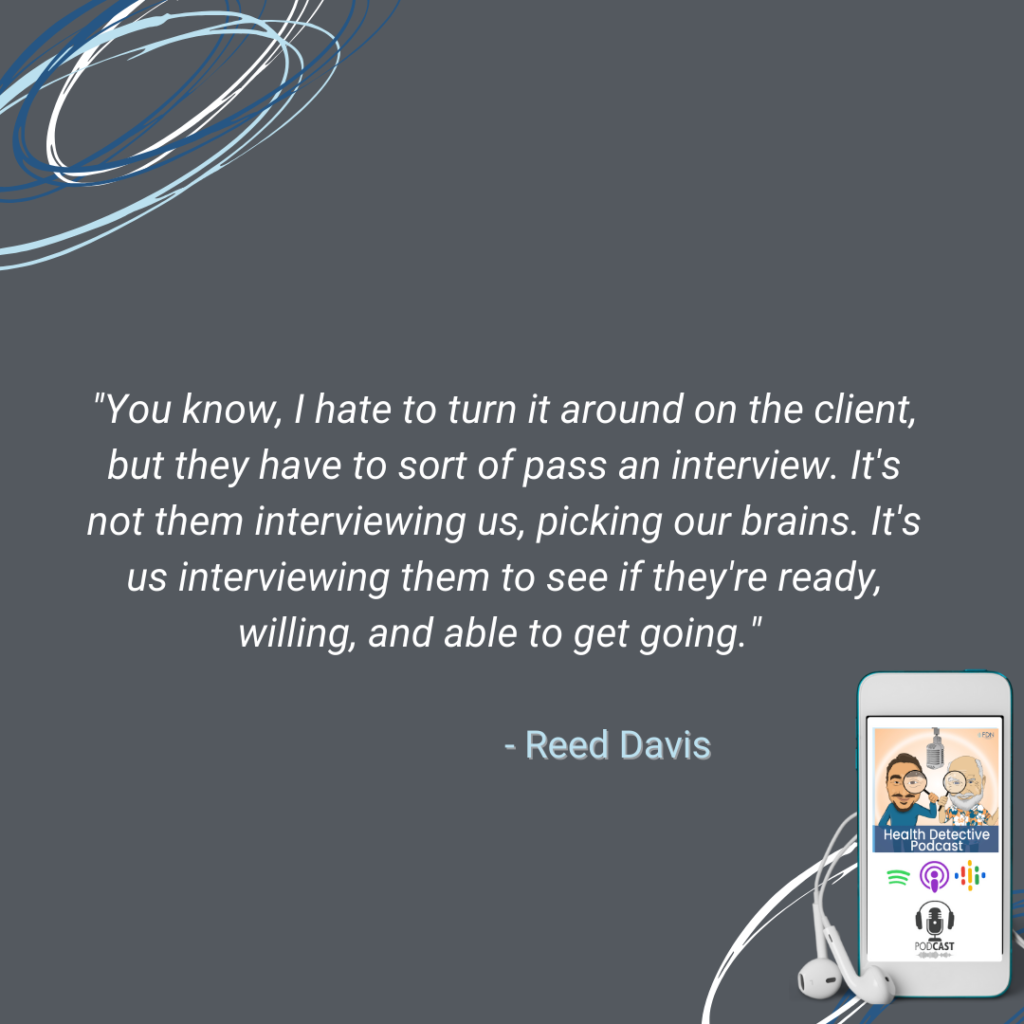
You know, I hate to turn it around on the client, but they have to sort of pass an interview. It’s not them interviewing us, picking our brains. It’s us interviewing them to see if they’re ready, willing, and able to get going. We’re serious about helping people. I mean, really serious. That is our mission. That’s our goal. That’s our livelihood. That’s everything to us, actually helping people.
We’re going to go through a little onboarding that makes sure that we have those, what you just said, reasonable expectations. When you have reasonable expectations, usually we over-deliver, end up getting more than what you bargained for.
Staying Sick is More Expensive Than Running All 5 Labs
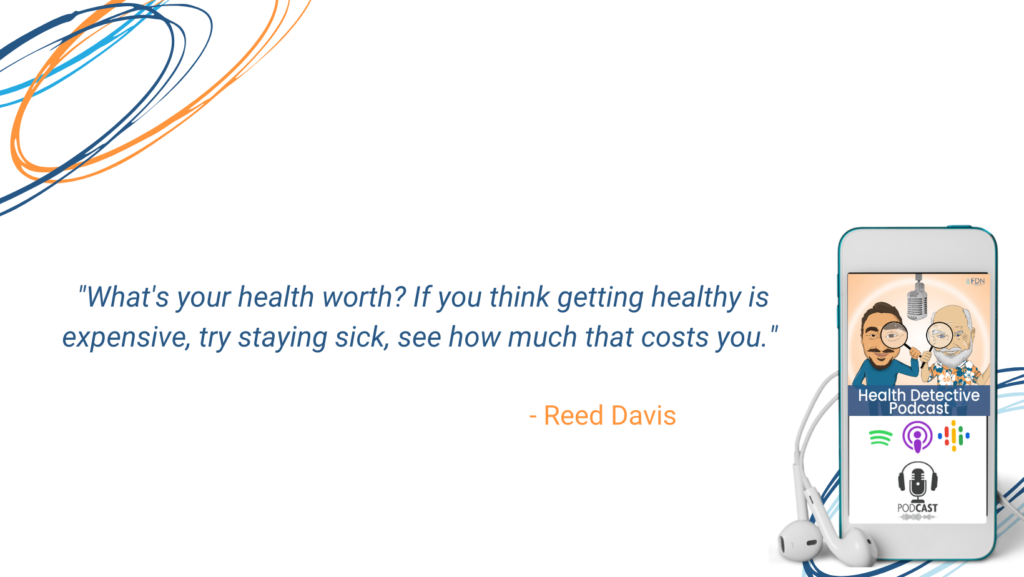
Like you said, what’s that worth to you? What’s your health worth? If you think getting healthy is expensive, try staying sick, see how much that costs you.
[00:17:13] Detective Ev: Right. You could just hear that on the stories on this podcast, especially with so many now. Guys, this is happening so often.
My girlfriend, Maddy, who you’ve gotten to meet a couple of times, Reed, she’s had some health stuff, minor stuff. She had no idea this was happening, and she was going to be a nurse at one point. Had no idea this was happening on the scale that it was until she listened to this podcast.
She’s like, Ev, you’ve beyond convinced me that this was going on. It is tens of millions of people in this country alone. But you know what? It’s not like necessarily every single person in every family. And not everyone has the will to actually change it. So, you don’t hear about it necessarily walking down the street, but this is happening in almost every single household around the world.
There’s plenty of people to work with. The cycle of trial and error, as you always say, I’ve introduced that a few times on this show, we’re just trying different things. The worst part about it is, not only will they spend all this money, like you said, you stay sick. My mom still had a full thyroidectomy and is still on medication for the rest of her life.
Guys, just so you know, if it’s your first episode listening, because I’m always really clear about this on here. This is not anti-Western medicine, let’s not be ridiculous. We have doctors in FDN, that doesn’t even make sense. What it is is the system’s being used incorrectly.
Charging Whatever You Want as an FDN Doing All 5 Labs
It’s great for emergencies, but when it’s used for chronic disease, these poor doctors don’t really have the tools. They’re not equipped to deal with that. What happens is these people with cancer, especially, or autoimmune, you will spend money until there’s no money left. Then at that point, medication for the rest of your life, an organ removed. This is pretty serious stuff.
Obviously, we want to get to FDN or similar philosophies, as quickly as possible. We don’t want to do that after a hundred grand. Most FDN programs are going to be anywhere between three and seven grand. Seven grand’s on that much higher end, depending on the experience of the person. Some of the best money they’ll ever spend.

[00:18:51] Reed Davis: You can charge whatever you want is the beauty of being an FDN practitioner. I know we don’t want to do a lot of stories now, but I’ve worked for free just because I wanted to help a person. I make them pay for the lab fees, but I’ve worked for no charge. I’ve also, over the years, raised prices, and raised prices, and raised prices. Because people are willing to invest in their health, and it’s whatever you want to charge.
Me, I like a lifestyle that allows me to work very hard, usually from four in the morning till about noon. I like to take the afternoons off. I love having my afternoons off and being able to take off on some weekends, travel a little bit. I just got back from Cabo for 10 days or so. I worked down there too, cause you can not only work when you want, but you can work where you want off a laptop computer. We’re doing distance coaching and things like that.
Working on Money Mindset for FDNs that Run All 5 Labs
So, when it comes to the money, you can charge what you want. Most of that depends on your own money mindset. If you have a poverty mindset, you’re probably gonna struggle a little bit at first. But once you start helping people and they’re appreciative, you start charging a little more, a little more. Pretty soon, you’re in a very comfortable place where you can afford to live the life you want for yourself.
[00:20:08] Detective Ev: It’s objectively true. The reason I know that is because we’ve all seen the practitioners in the space that have 10,000 certifications, but they’ve never really had more than three clients because they don’t believe in themselves, unfortunately. Then there are people that do FDN alone, and they have multiple six-figure businesses.
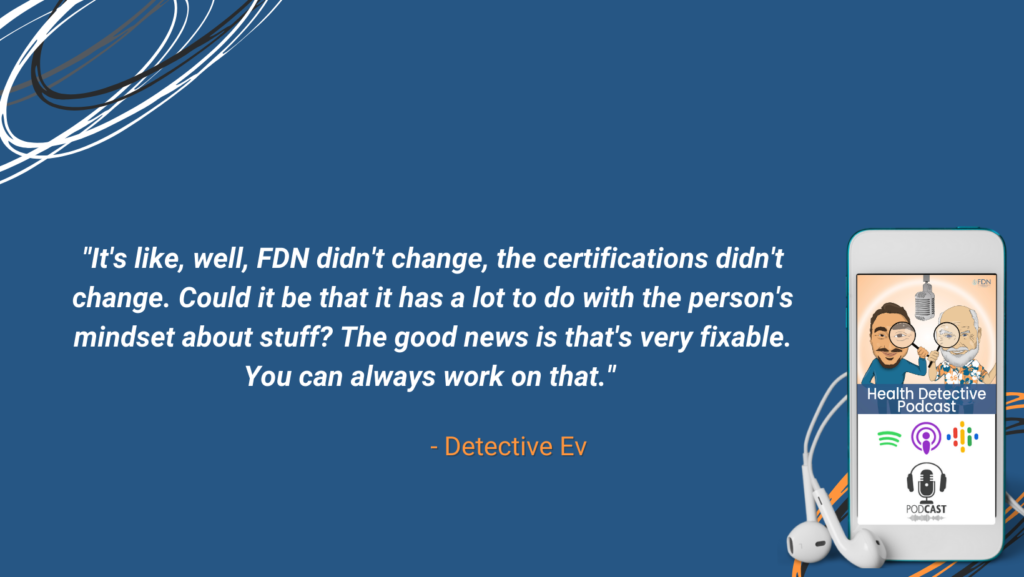
This is real guys. That’s actually like true. It’s like, well, FDN didn’t change, the certifications didn’t change. Could it be that it has a lot to do with the person’s mindset about stuff? The good news is that’s very fixable. You can always work on that. I constantly work on mine. I know that you’re huge into personal development. I remember you shouting out 7 Habits of Highly Effective People, if people want something to read, Stephen Covey and stuff.
Well, it’s amazing how much you and I can talk. It’s already been 18 minutes, believe it or not. So, let’s get into the labs themselves and kind of really break this down for people.
Taking the Fluids IQ SHP When Running All 5 Labs
And keep in mind, Reed, I am doing a series right now where I do like 20 minutes on each lab. But I still want to give some people some meat of this stuff and really talking about what we use. We just recently updated the hormone kind of stuff. It was a different company when I was doing my stuff. Now it’s even more advanced.
You have a great relationship with this company called Fluids IQ. So, what are some of the things that we’re doing with this new hormone test that we have? What are we looking for? Because some of the things have stayed exactly the same. And then you’ve added new markers on as well.
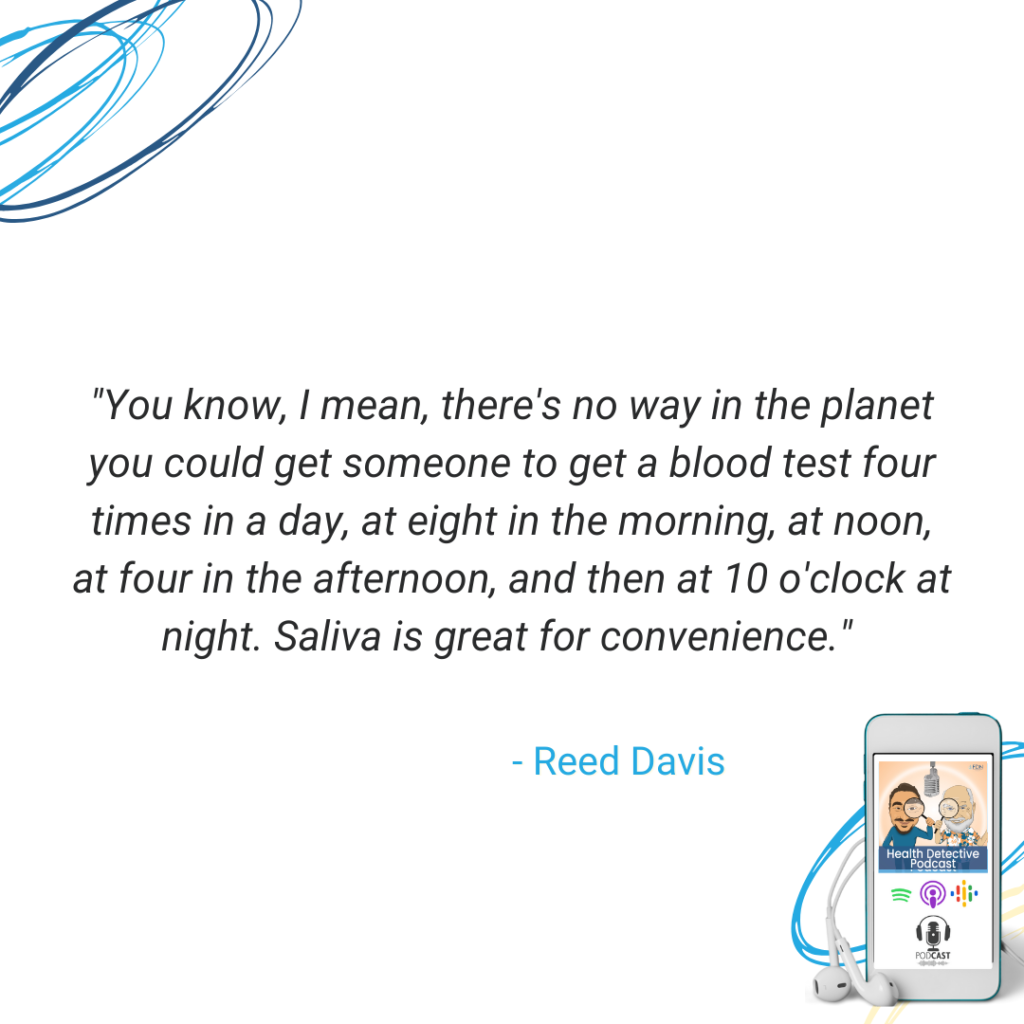
[00:21:21] Reed Davis: Oh man. Well, I love that test. Number one, cause it’s saliva, which is very convenient. You know, I mean, there’s no way in the planet you could get someone to get a blood test four times in a day, at eight in the morning, at noon, at four in the afternoon, and then at 10 o’clock at night. Saliva is great for convenience.
It’s also very reasonably priced and also it gives you the bioavailable levels. That’s what’s being used by the body right now. It’s not an accumulation of the last three hours or three days or anything like that. It’s bioavailable levels now. That means you can get time specific measurements, morning, noon, afternoon, and night.
Revealing a Body’s Break Down When Running All 5 Labs
Two of the main things we look at, there’s cortisol, which is your stress hormone. It’s also your catabolic hormone. We look at DHEA, which is involved in stress, but it’s more your anabolic hormone, builds the body up.
Now we’ve all heard of metabolism. Look it up on Wikipedia, you’re going to see that it’s the sum total of all activity going on in your body, all at one time, every chemical reaction, every metabolic pathway. This term, metabolism, should be simplified into, building up and breaking down.
The cortisol breaks you down. The DHEA is representative, building you up. Looking at metabolism, are you catabolic from too much cortisol? Or are you anabolic like kids and young people? They’re very much more anabolic. They have higher levels of this good hormone.
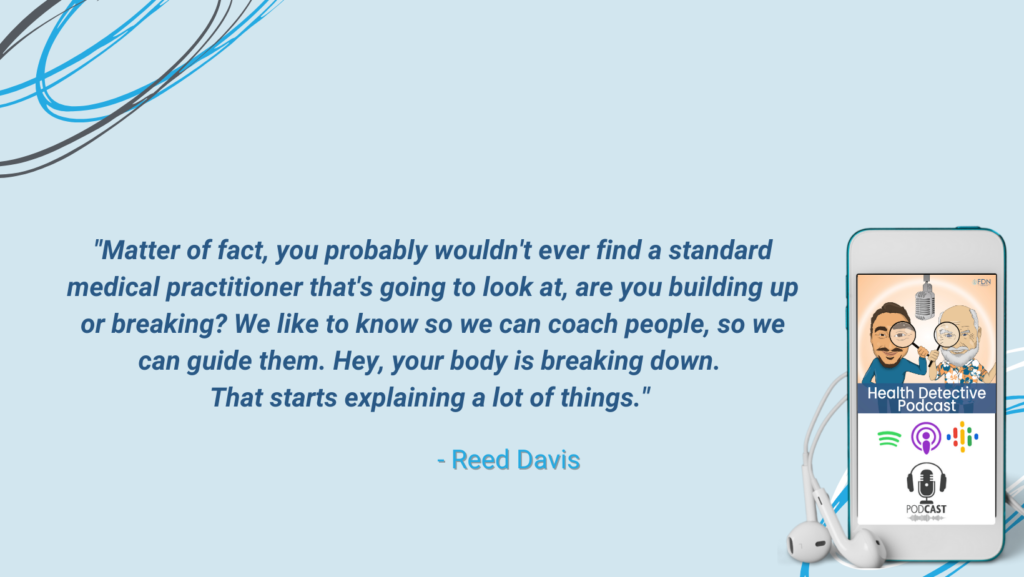
Cortisol by itself isn’t bad. We look at that cortisol to DHEA ratio. Are you building up? That’s significant. It’s not a medical diagnosis of any kind. Matter of fact, you probably wouldn’t ever find a standard medical practitioner that’s going to look at, are you building up or breaking? We like to know so we can coach people, so we can guide them. Hey, your body is breaking down. That starts explaining a lot of things.
Some of the other things involved in that test are the sex hormones, progesterone, testosterone, and estrogen. You mentioned the new markers and I’m really excited about adding melatonin to the noon marker. Again, this is very time specific with saliva.
Where should your melatonin be at noon? It should be in the basement. You’re wide awake. It’s daytime. Why would you have high levels of melatonin? Well, you would have higher levels of melatonin, which we see if you’re dysfunctional, especially in the gut, if you have gut dysfunction.
Pointing a Finger at Gut Dysfunction When Running All 5 Labs

So, it’s a finger pointing in that direction. Is that a medical diagnosis? No, it’s just pointing the finger at something that needs to be improved, gut dysfunction. You might even look at the other labs and start getting this whole constellation of markers together and be able to really explain why a person is showing up in bad shape.
This is just a saliva test. You can do it in the convenience of your home. It’s cheap. You send it into the lab. We get the test results for the client and with their permission, are able to use it. Use the data to explain why they’re showing up in bad shape. We’re not diagnosing and treating anything specifically. You’re saying, well, this explains things.
The other marker on that test that I was mentioning is the morning Secretory IgA. That’s another finger pointing at gut dysfunction. It happens very often that the cortisol to DHEA ratio is out of whack. You’re more catabolic, and cortisol starts shutting down in the gut. Secretory IgA is a marker there that will be lower, even chronically low, because of this dysfunction. That’s just more places where a person can be coached to heal themselves.
So, we have the catabolic to anabolic ratio. Matter of fact, the total cortisol even tells us what phase of dysfunction you might be in. We have the sex hormones, of course, which, we’ll go into that as much as you like.
But having that melatonin, another finger pointing at another area of dysfunction. The Secretory IgA, which by the way, if it’s high, you probably have an active infection, something that you might want to get referred out for, or that we can just look at our other test results and explain that to you, also.
Exercising Clinical Correlation When Running All 5 Labs
[00:25:35] Detective Ev: I don’t want to get too off track with it, but I love that you mentioned the active infection thing. Because to the untrained person right now, they may be saying, well, wait, what did he just say? That’s a hormone test. They can tell that type of stuff? This is basically what we’re learning in FDN more than anything else is this clinical correlation.
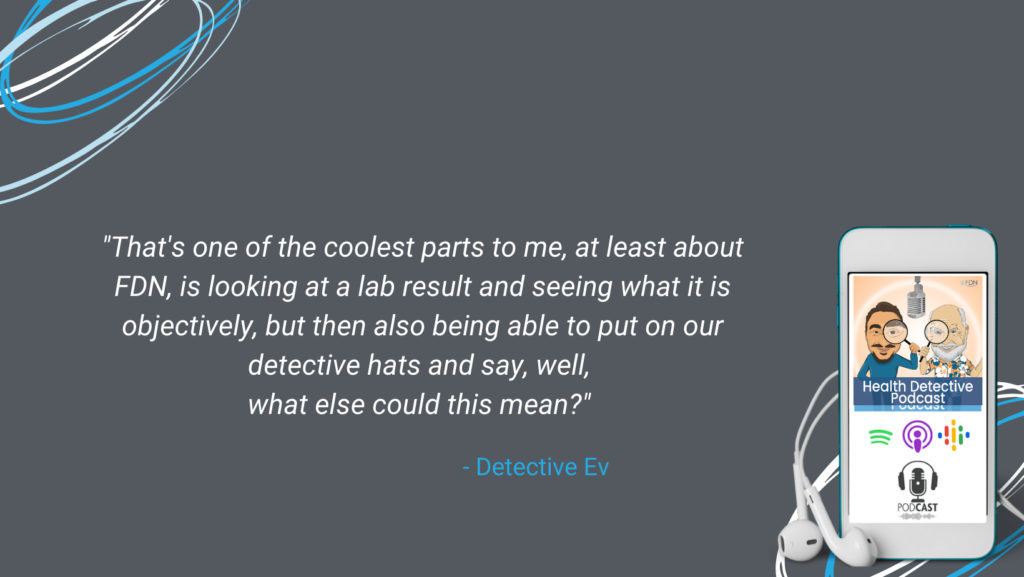
We are looking at these labs in ways that even if a doctor did run them, they’re not necessarily trained to do. That’s one of the coolest parts to me, at least about FDN, is looking at a lab result and seeing what it is objectively, but then also being able to put on our detective hats and say, well, what else could this mean?
Their cortisol spiked at night. This was a relative elevation. Could that mean they fought with a family member or spouse? It could. But could it also be a gut bug? It could be that. Maybe they ate something that pissed off their body right before bed. It’s not like you know always exactly what it is, but you’re able to start asking these questions with the client, very astute questions.
Eventually you can kind of figure out normally, oh, that’s what happened. You know, you guys were late on taxes or whatever, and your husband didn’t pay the bill. Now you’re yelling at him before bed and that cortisol went up on that night. So, it could be a bunch of things that are going on.
Validating Symptoms When Running All 5 Labs
I think the hormone test is one of the most validating things, because I’ve mentioned this to you before, I was a 21-year-old guy when I ran this hormone test. Of course, very understandably, people were saying to me, like, all right, man, come on, you should have so much more energy and be able to do all these things. I swear to God, Reed, I was trying.
I was working all the time. I went out to California and learned about FDN and ironically was working night shift at the time to survive out there, which I know now I would never do again. I remember I was delivering food at the time. It was like, you know, just starting out in my life. I was still figuring out the health stuff.
Reed, I was going up the stairs one night just to deliver food, man. My eyes started getting blurry, I couldn’t really see well. I was seeing stars and stuff and I just felt so weak. I couldn’t even get up like a couple flights of stairs. I’m like, this is not okay, Ev.

I’m eating organic at the time, man. I thought I was doing the right stuff. It’s not that I had no knowledge in this. I mean, I was lacking knowledge, of course. I found FDN, I ran the hormone test about a month later. I was in the exhaustive phase, just starting in the exhaustive phase of HPA Axis Dysfunction. Cortisol was tanked, no melatonin at night. My DHEA was like three or four, maybe even five times above the reference range. My body was trying to hang on. It’s no wonder I felt that way.
Correlating Clinically with Clients When Running All 5 Labs
This is very validating for people because we can show them probably more clearly than any other of the tests why they feel exactly what they feel. Even the time of day that they feel those ways you could really correlate it pretty clearly.
[00:28:03] Reed Davis: Absolutely. I’m glad you mentioned the clinical correlation. Because of all the skills you learn in FDN, in our program, I think that might be the most valuable. Learning how to correlate the lab results with a person, because you don’t want to treat the paper.
So, go back to the thyroid, they might’ve had a thyroid test cause it “sounds like” thyroid. They’re using the “sounds like” method. Sounds like thyroid, run a test. Yep. It’s your thyroid, all right. Here’s your medication. Now what happens with that is you go back periodically to get the same test, just to check where are the numbers and then adjust or titrate the dosage.
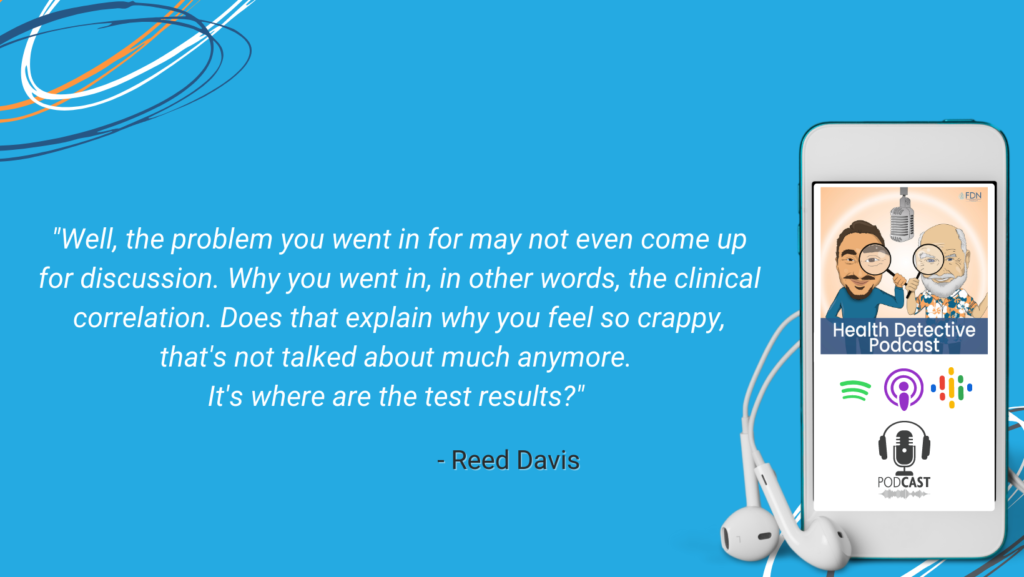
Well, the problem you went in for may not even come up for discussion. Why you went in, in other words, the clinical correlation. Does that explain why you feel so crappy, that’s not talked about much anymore. It’s where are the test results? Oh, we got to get this number down a little bit more, or up a little bit higher. We’re going to adjust your dosage. Thanks very much. See you in three months, in that eight-minute visit, if that long.
This has nothing to do with what we do. We don’t think that way, we don’t treat the test results. We clinically correlate with one individual. It’s exciting to do that because that individual is going to say, wow, how come no one else ever taught me this before, or explained it in this way?
Using Clinical Correlation as a Lifelong Skill When Running All 5 Labs
Instead of diagnosing and treating the test results, some of the ones we use can’t even be used for diagnosis. But they sure explain an awful lot about what’s going on with the person.
[00:29:42] Detective Ev: The last thing we’ll say about the clinical correlation, because you said it might be one of the most important skills that we learn as a practitioner, I would say it probably is. Because to me, Reed, even though we use these labs and they’re fantastic, I don’t necessarily need those labs to be a good practitioner. I can take that skill and look at any test. Of course, there’s more optimal tests than not. That’s why we use the ones we use at FDN.

But someone could give me anything I’m trained in, and I could figure out things that other people might not be able to figure out. That’s a lifelong skill that you could take pretty much anywhere, even if you’re a doctor. That’s why we have doctors that go through the FDN course.
They’re trained in diagnostic codes and reference ranges. If the reference range is too high or too low, here’s this medication, if we could diagnose something, mazeltov. But we got to figure out why this person feels the way that they feel. And it’s not always the thyroid, like it might seem. It could be other things. We could go on forever on that. Just for time’s sake, we’ll move to the next test.
I want to move to this test. It’s not necessarily in any order, just so you guys know. The MRT food sensitivity test. This is going to be the one that our Canadian and USA practitioners get to use. Keep in mind, we have active practitioners in 50 countries around the world.
Testing for Food Sensitivities When Running All 5 Labs
Now, if you can get the MRT, knowing the technology behind it, I think it takes the cake out of all of these. If you don’t mind, I’ll briefly explain it.
The MRT, guys, is different than really all of the food sensitivity tests out there. When you hear about something like the Elisa, let’s say, the E L I S A, it’s probably one of the more common ones, it’s testing for IgG. That’s Immunoglobulin G. That’s one way that the body could react to a potential antigen.
That’s not complicated. That just means like a food protein, right? That’s the potential antigen in this case, or a food chemical maybe. So, you have IgG, that’s great, but that’s only one way. Now, unfortunately, for that test, is that there’s hundreds, if not thousands of ways that the body could react to a food, right?
When you spend $250 on one test, if that’s all you have in some countries, that will be the main thing. Let’s be honest. That’s great. Let’s figure that out. If we can take the person off those foods temporarily, great. If that’s what they want to do.
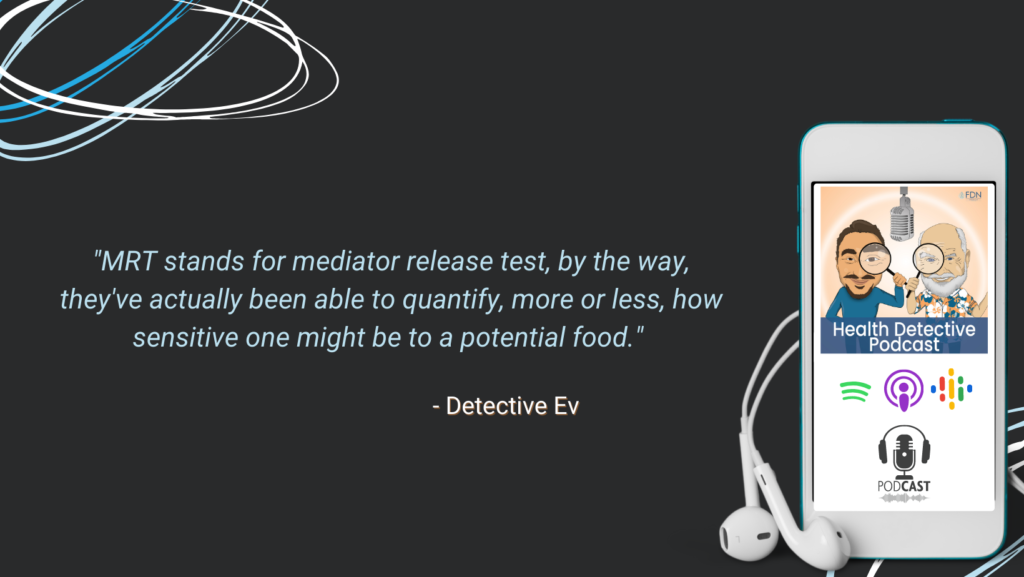
But the MRT uses something where they’re measuring volumetric changes, size changes, in the white blood cell. So, you’re not actually able to look at those test results and say, oh, well it was IgG and IgA and IgM. You can’t see anything of that specifically. But because they’re looking at those changes in the white blood cell, which is where a lot of these mediators are released from. MRT stands for mediator release test, by the way, they’ve actually been able to quantify, more or less, how sensitive one might be to a potential food.
Helping Clients Feel Better Quickly When Running All 5 Labs
So, they have a 93.6% replicability rate. What I’ve seen, Reed, is that only gets better over time as they get more and more tests in and more and more data. Eventually, this thing’s going to be even better than that. But 94% is pretty good in the world of food sensitivities, let’s be honest.
I don’t know if you’ve seen this, Reed, I’ve seen in the world as like a consumer, there’s just a lot of controversy around the food sensitivity tests now. I think that’s been given a bad rap. One because of the single type of tests, like an IgG or something. But number two is you don’t have a practitioner using it in the right way.

If your practitioner only used a food sensitivity test, yes, we would agree that that’s an incomplete form of care. But when you use that in a system with all these other things, guys, you can make people feel better in three to six days sometimes, three to seven days, maybe like a week. Then you actually heal the stuff so that they don’t keep just developing more food sensitivities to the new foods that they’re now eating.
I’ll pause there. I know you probably have a million things to add to the MRT. But I think it’s a question for you. How did you come up with that one or want to use that one?
[00:33:17] Reed Davis: You covered a lot of ground, you know, and that’s good thing.
Measuring Levels of Reaction When Running All 5 Labs
There’s the science part of it, like you mentioned, the mediator release. It’s not the same as looking at an immunoglobulin response. Your immune system might respond to something, but as to whether it’s actually causing or contributing to the symptoms, it’s very hard to determine with the IgG tests. IgE is a little more accurate because IgE is what causes your eyes to water, your skin to itch. If a dog walks in the room, and you have an IgE response, it’s going to be really fast. You’re going to get itchy. With foods, it could be the hives. You’re going to get red patches or certain things.
So, there’s IgG, IgM, IgA, IgG, as you mentioned. Sometimes it’s a little more obvious that the symptoms attached to that elevation. The immune system’s responding.
I like the mediator release test. It’s a better screening for us to use because it measures, not that part of the immune system, but the release of mediators. These are inflammatory factors, like prostaglandins.
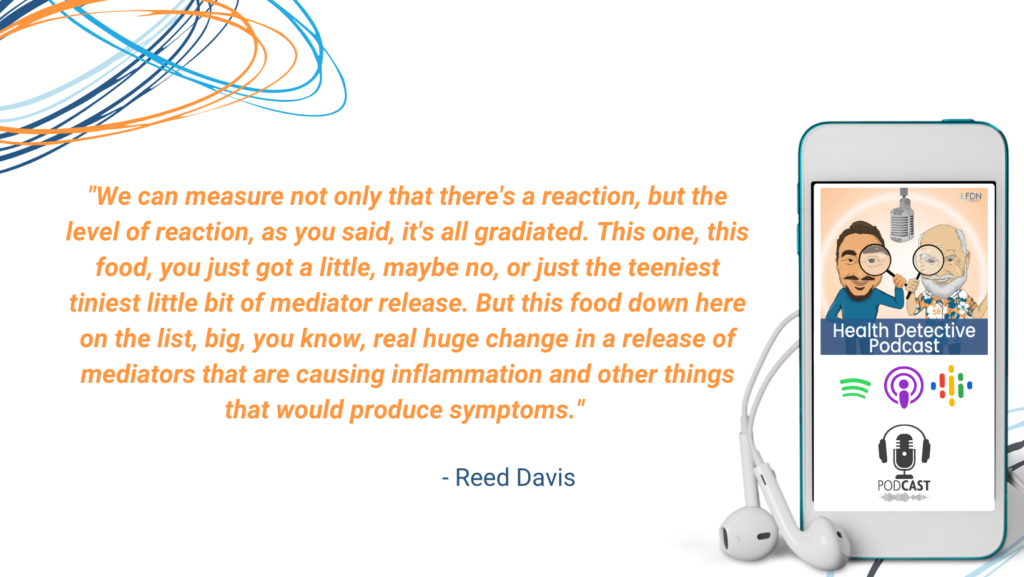
By the way, the mechanism that helps the lab work is those things are released, there’s a volumetric change in the blood itself. We can measure not only that there’s a reaction, but the level of reaction, as you said, it’s all gradiated. This one, this food, you just got a little, maybe no, or just the teeniest tiniest little bit of mediator release. But this food down here on the list, big, you know, real huge change in a release of mediators that are causing inflammation and other things that would produce symptoms. It’s gradated.
Getting Off the Cycle of Trial & Error by Running All 5 Labs
There’s 170 foods. It does require a blood draw, but it’s not that big of a deal. They have mobile phlebotomist all over. Any doctor’s office can do a blood draw, pretty much. You get the darn thing done and get it sent in.
Here’s the interesting part, getting people to remove those foods from their diet, aside from anything else you want to say about their diet, looking backwards has, like you said, three, six, nine days later, miracles, almost miraculous changes in some people. Looking backwards, wow! Sure am glad I ran that test. Like bam, complete change in migraine headaches and ADD and ADHD and skin conditions and joint pain and problems, fibromyalgia, all these things like almost clear up.
Why? Because those foods were a major contributor to what was going on with that person. You can kind of see that right in front of you on paper that, hey, we got to get rid of these foods.
Looking forwards, there’s no tests that you can tell is going to be the one that’s gonna nail it for that person. I’ve had people with migraines, miraculous recovery, I mean, miraculous recoveries. You doing that test and getting rid of those foods, others with migraines, aye, not so much. You know, it helps a little bit. Obviously, there’s other contributors to that person’s migraines. That’s why we don’t run one test.

We don’t guess which test to run. We run our sort of comprehensive assessment on every person, that way we’re covering as much of the constellation, H.I.D.D.E.N., as we can. You have to invest if you’re on that cycle of trial and error, the only way we know to get off, is to let us do our thing.
Encouraging Client Compliance When Running All 5 Labs
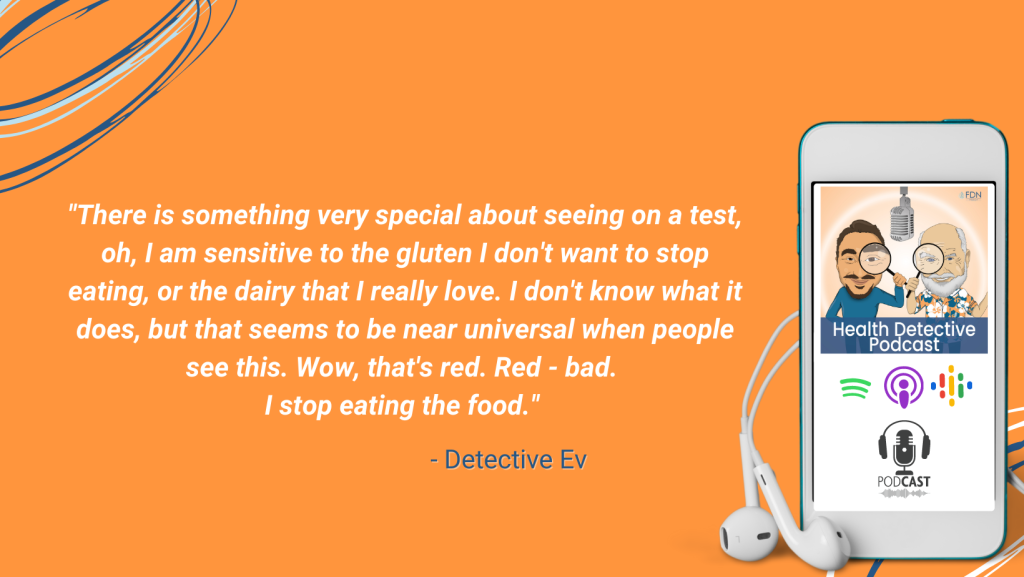
[00:36:41] Detective Ev: Yeah. Last thing I’ll mention about that, very practical thing, is just client compliance, guys. There is something very special about seeing on a test, oh, I am sensitive to the gluten I don’t want to stop eating, or the dairy that I really love. I don’t know what it does, but that seems to be near universal when people see this. Wow, that’s red. Red – bad. I stop eating the food. You know, like you’ve got the smartest person in the world until they see that objectively.
[00:37:06] Reed Davis: Yeah. The other part of it is, green – good. So, the issue, the mental thing for clients, they look at the red list, oh, I can’t have this anymore. I can’t have that anymore. The green list is always bigger. The green list is what you can have. So, start looking in there.
Oh, I like that. I like that. I want to try that. I always wanted to try this and that. You can find these things in any grocery store, pretty much. Hopefully you’re using organic foods. It gives you a new shopping list. It takes the guesswork out of what the heck do I eat? It’s remarkable.
Now we also use another diet typing system to help. But man, it’s that, plus get rid of those foods. By the way, there are other types of oral intolerances, that’s really the term I’m using more than food sensitivity. You’re orally intolerant to certain things. It might not be the immune system at all. It could be that you just can’t digest it. You can’t break it down and absorb it. You don’t have the enzymes. You’re not getting enough of the enzymes.
Doing Metabolic Typing Along with All 5 Labs
Lactose intolerance being the most common, people are gonna understand. There’s a sugar in milk it’s called lactase, you need lactose to break it down. If you’re not making the lactose, you’re gonna have a hard time breaking it down. It’s going to probably produce gas and bloating and indigestion and maybe even some diarrhea or something like that. That’s a different type of oral intolerance. Of course, we teach the full spectrum of oral intolerance testing.
[00:38:40] Detective Ev: Well, cool. Moving right along. I think you already hinted at this next one, that just makes sense logically. You said there’s another thing that we do with diet to really hone this in for people.
The MRT, not for all the foods on there, like if someone’s sensitive to gluten, guys, you probably want to keep them away and you’re not serving them by having them do that every three weeks. That’s probably something that they might want to consider lifelong. I’ve done it as a lifelong thing. Now, I’m way better for it. The most of those things, you’re going to be able to reintroduce one day because we teach you how to actually heal the body so that it can eat those things.

Then the Metabolic Typing Diet, which we’re going to talk about next, it can fluctuate, but generally speaking is going to be more of a long-term solid thing that really helps lock in the dietary interventions for these people.
I know so many people have not even heard about metabolic typing. I know, again, we have limited time, but what is metabolic typing or what does that diet do? Is it only one diet or is it a mix of things? Of course, I know the answer, but for the listener.
Figuring Out Ancestral Diet with MT & All 5 Labs
[00:39:35] Reed Davis: Yeah. Well, metabolic typing is a system of assessing one’s dietary and other needs. It actually could be used for a total epigenetic program. Your entire lifestyle could be modified based on your metabolic type. But we use it for the “D” in D.R.E.S.S., so diet.
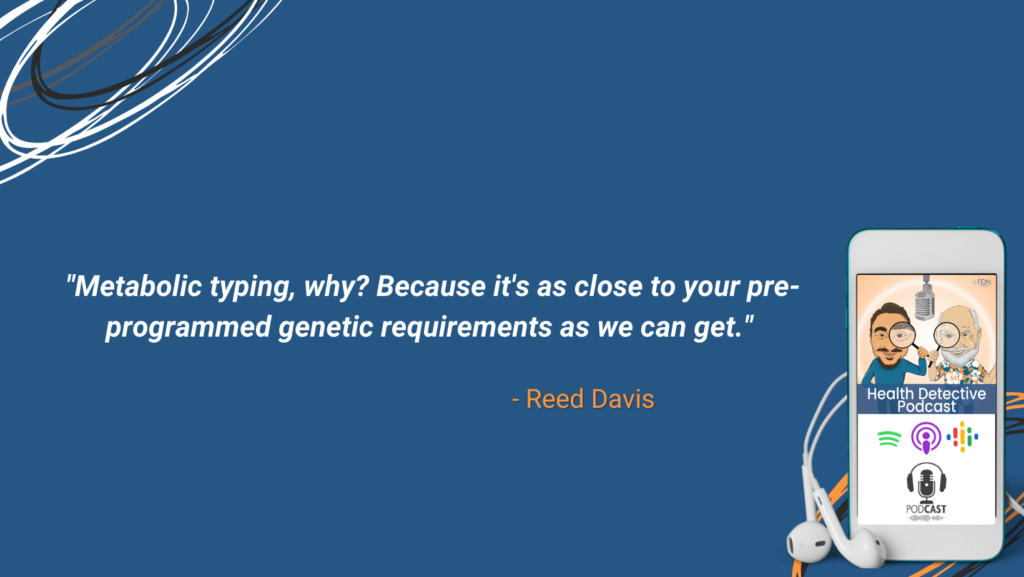
Metabolic typing, why? Because it’s as close to your pre-programmed genetic requirements as we can get. So, if you’re eating the way you’re genetically programmed, and I’ll explain some of the details in that. If you’re eating the way you’re genetically programmed, well then shouldn’t your gene expression be healthy and good and the way it’s supposed to go? You know, you should be healthier.
Now, if you’re eating opposed to your genetic requirements, what’s going to happen then? You’re going to pay the piper is what Bill Wolcott says. Metabolic Typing, by the way, has been around for, or forms of it, for 40 50 years. It’s developed out of a lot of really good solid research on basically ancestral diets. The problem is we don’t know who our ancestors were anymore.
12,000 years ago, when transportation and agriculture and all this started super developing, we got mixed. There’s hardly any pure anything anymore. There’s hardly any pure anything anymore, that was mean. So even knowing your ancestors anymore may not be all that helpful.
You could say, well, I’m part Russian, part German, part Italian. What does that tell you that you should eat? It doesn’t really tell you much. Even the genetic tests now they’re giving me, I’m 2% Neanderthal. Well, what would the heck did they eat? You know, like raw mammoth meat or something? I don’t know.
Getting the Right Percentage of Protein, Fats, and Carbs
Instead, Bill Wolcott (he’s a good friend of mine), he developed over a 30-year period – going on 40 years now, a test that you can take. It gets psychological characteristics. It gets dietary habits and traits, physical traits and characteristic things, puts it all together. Then you have a fairly accurate assessment of what your ancestral diet should look like.
So, when you hear ancestral diet or paleo diet, I say, yeah, God bless you. Which one? Which ancestral diet? If almost all of your genetics are from the Chetchwen Indians in the Andi mountains of South America, and your ancestors never lived below 8,000 feet, and ate mostly corn and potatoes, which is what the ancestral diet is down there, that’s a heck of a lot different than if your people come from sea level and ate nothing but seal organs and whale blubber and just a little piece of seaweed once in a while. Maybe just a seasonal nut or seed that was growing in someplace up there, you know? Two completely different ancestral diets.
Again, because we’re so mixed, there’s no way to guess about that correctly. Although people are doing it. They’re telling you eat meat and meat and fat only. You know, it’s wrong for some people.
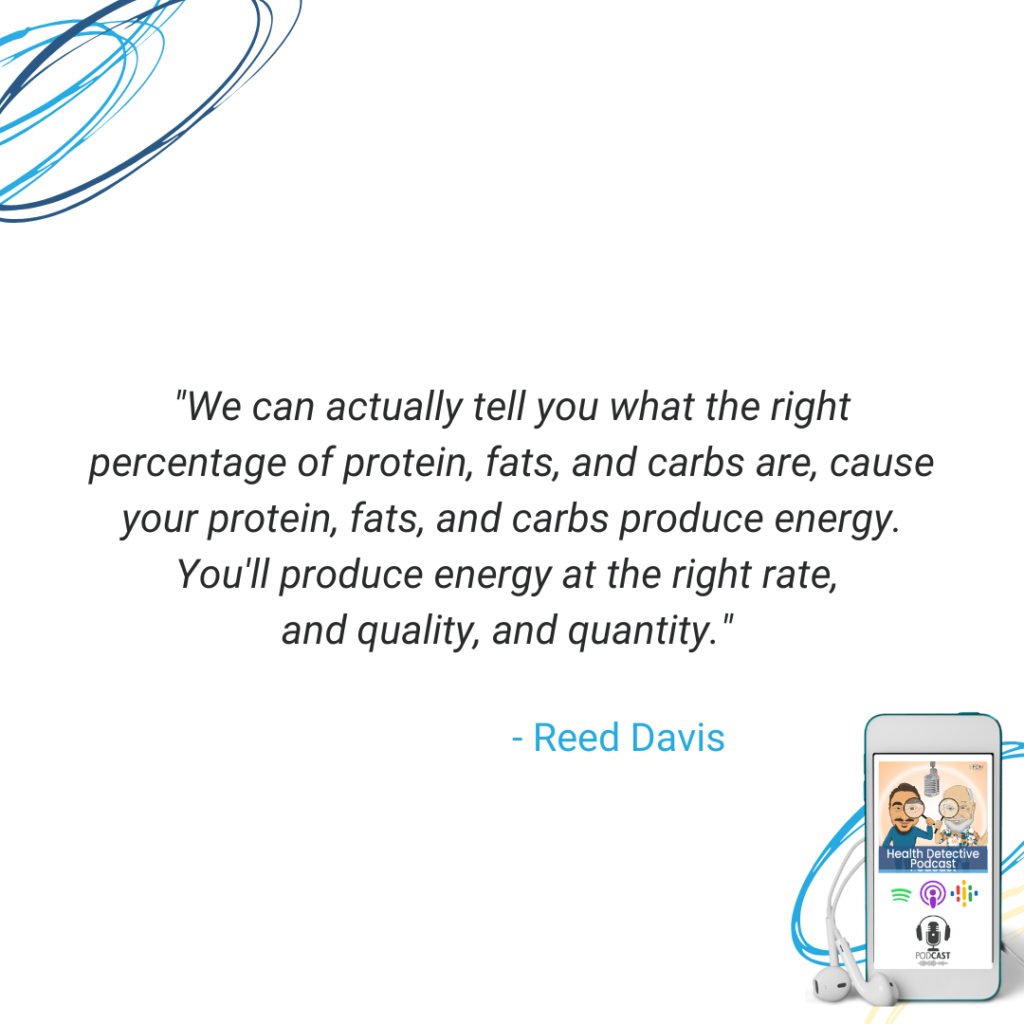
So, that’s basically a little bit about metabolic typing. We can actually tell you what the right percentage of protein, fats, and carbs are, cause your protein, fats, and carbs produce energy. You’ll produce energy at the right rate, and quality, and quantity.
Getting the Right Percentage of Micronutrients
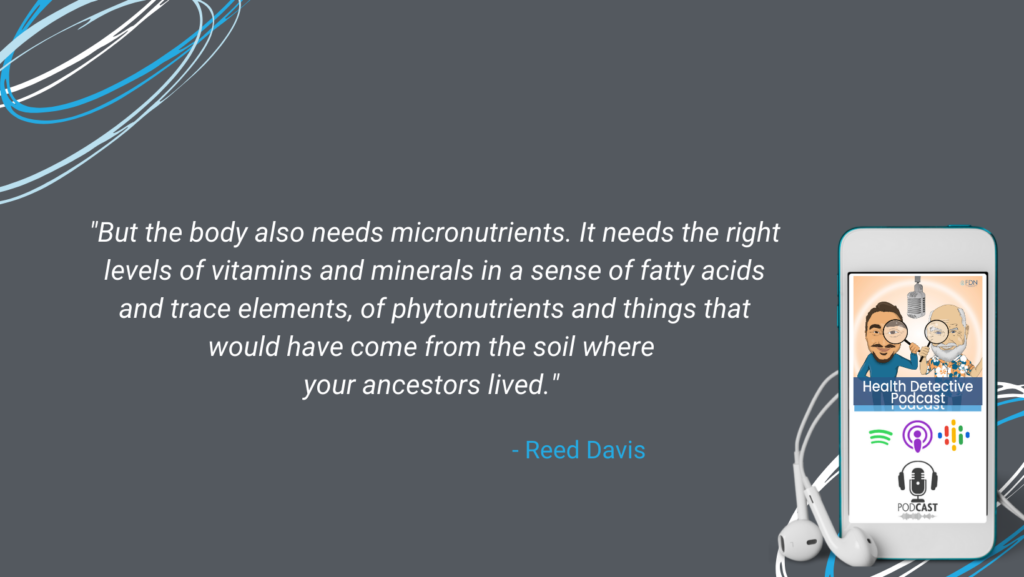
Energy is used by the cells so that they can do their job. And you don’t have to tell them what their job is, they already know that. That’s pre-programmed what their job is. You just have to fill them correctly. But the body also needs micronutrients. It needs the right levels of vitamins and minerals in a sense of fatty acids and trace elements, of phytonutrients and things that would have come from the soil where your ancestors lived.
So, the Bantu tribe in Africa had a certain soil, the levels of minerals and the various mix there of vitamins, minerals, trace elements, phytonutrients and such, would be a lot different than that Eskimo, again, the one who eats seal blubber. That’s all coming out of the ocean, completely different micronutrient needs as well as completely different macronutrient ratios.
[00:43:52] Detective Ev: Cool. I’d love to comment, but you know those ladies will kill us if we’re not on for our Live. We should have scheduled like three hours for this. But sometimes less is more.
[00:43:59] Reed Davis: Just keep them guessing.
[00:44:03] Detective Ev: Well, and again, remember guys, I’m doing that series too. So, if you want more information on any of these, go check those out. We’re working on it.
The next one I’d love to get to, Reed, is the Fluids IQ Mucosal Barrier Assessment. I actually have not got to run this one on myself yet, but I love that we do this. This is basically, in the simple form, our way of looking at leaky gut in an intelligent way, rather than just guessing, even though we can probably guess pretty fairly, most people are having some level of intestinal permeability. But it’s also more than that.
Using the Mucosal Barrier Assessment When Running All 5 Labs
So why do we use the Fluids IQ, Mucosal Barrier Assessment? Like what is all that we’re looking at there?
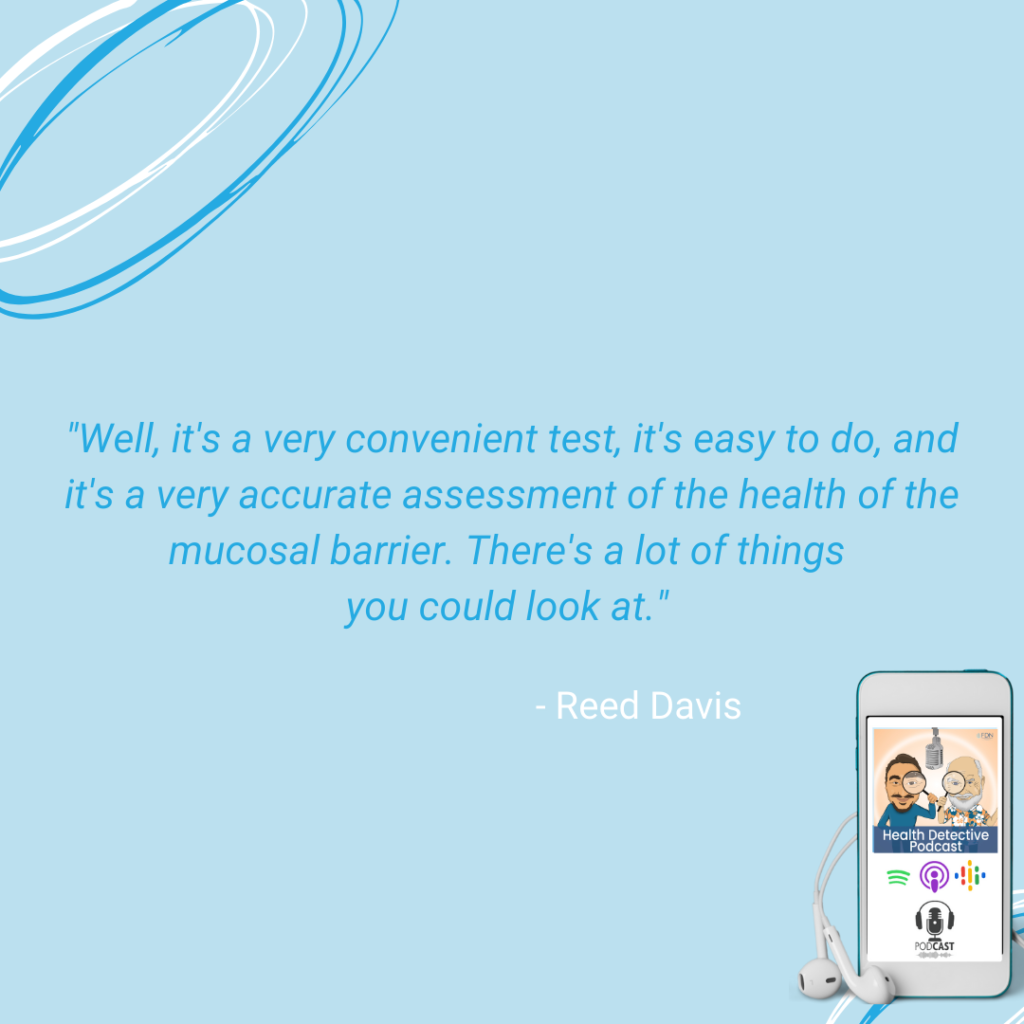
[00:44:34] Reed Davis: Well, it’s a very convenient test, it’s easy to do, and it’s a very accurate assessment of the health of the mucosal barrier. There’s a lot of things you could look at. Matter of fact, our Metabolic Wellness Panel has the Indican, which is a look at the mucosal barrier, if you want to. Even having an elevated liver congestion on that test gives you insights into the mucosal barrier.
But this one is a fingerstick test. So again, it’s very easy to do at home. You just take a little thing, you prick your finger, you drip some blood out onto a blotter. You let it dry, and you send it to the lab. It’s fast, it’s reasonably priced, and it gives the lab something to work with.
They’re going to, first of all, give us your Zonulin measurement, which is a chemical your body releases when it wants to flush out the submucosa. So, we have our gut and it’s basically a tube. You’ve got the Villi, little fingers that are absorbing food. The environment inside the gut is a good combination of microflora, you know, the good bacteria, bad bacteria, what have you.
But things penetrate into the submucosa, into the lining of the gut. Every now and then the gut wants to flush that crap out. By the way, there’s toxins being produced by your body. It can’t get flushed out the same way. So, Zonulin opens up the tight junctures to flush things out. The problem is it gets stuck open because we have so much going on and there’s bad things out there in that environment.
Assessing a Major Part of the Immune System When Running All 5 Labs
And there’s like that Secretory IgA, which is the main immune component in the mucosal lining of the gut. That’s why we call it the Mucosal Barrier Assessment. We want to look at those tight junctures and see if they’re chronically open. Now they’re not just being used to flush out, they’re actually letting worse stuff come in. That’s what we call leaky gut. First of all, it’s supposed to be a little bit leaky to flush out, to release toxins from inside.
Because what would happen to them? Well, they’d get caught up in your normal passage of food and into the colon and excreted in your feces, of course. So, a good part of this should be a little bit leaky, but only outflow, it shouldn’t let anything bad in. That’s exactly what happens and that’s the condition we get into.
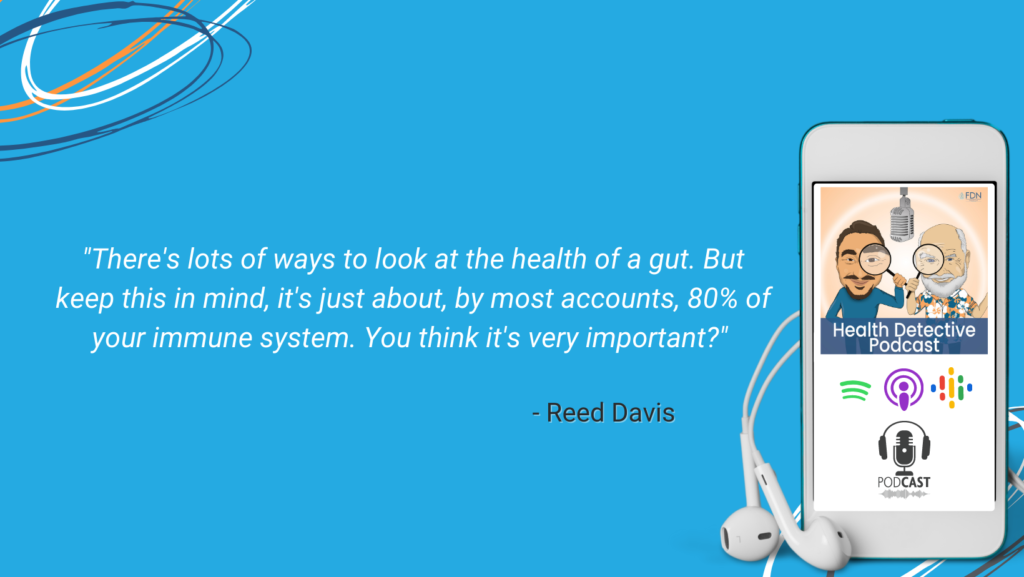
So, it assesses that in different ways. It looks at the health of that gut, including the diamine oxidase to histamine and the ratio of those two. There’s lots of ways to look at the health of a gut. But keep this in mind, it’s just about, by most accounts, 80% of your immune system. You think it’s very important?
Not only is it allowing you to take in food and get the nutrients out of it, again, your proteins, fats, your carbs, your vitamins, your minerals, and trace elements, essential fatty acids, amino acids. All of these things come through it that we want to, the normal diffusion through the villi, for the most part. We want it to release a little bit of toxins, but we don’t want any new toxins coming in. That’s pretty much what leaky gut is.
Looking for Overall Gut Integrity When Running All 5 Labs
By the way, if you have leaky gut, if you have a high Zonulin, there’s also the blood brain barrier. There’s lots of leakiness to be going on in your body besides the gut. It’s an overall assessment of, if you want to say it, leakiness

[00:47:55] Detective Ev: This is not the only thing that we’re looking at for overall gut integrity and things that are going on in the gut. Our main one for that is actually the GI MAP by Diagnostic Solutions Laboratory.
I got a comment on this one. I love this thing, because, Reed, this found something in a very short period of time right after I got an endoscopy, and the endoscopy did not find it. Endoscopy didn’t even find H pylori, two months later. I was not actively dating. I wasn’t sharing drinks with anyone.
I say that guys, because H pylori is something that can come through the saliva. I wasn’t swapping saliva with anyone in any way. So, I’m pretty sure I had this beforehand. I’m pretty confident of that. And the GI MAP was able to find it.
One of the really cool things about this test is, traditionally our best option, and unfortunately some people are still only using these, was stool culture tests. Now they’re great, you know, all is better than nothing, just like an IgG test. But with the stool culture, you’re relying on bacteria and these things to grow on the stool. As you taught us, Reed, it’s about like 95% of those things will die once they’re exposed to oxygen. So, stool culture testing is not necessarily the most accurate thing that we could have.
Getting Trained to Use the GI Map is Important When Running All 5 Labs
Whereas the GI MAP is PCR, DNA testing. If you think in your head, well, haven’t, I heard of that before? Yes. That’s what a lot of the like, multiple day COVID tests were with the PCR testing. Of course, some people were saying, well, wait a second. Doesn’t that just show like too much, could it show a false positive?
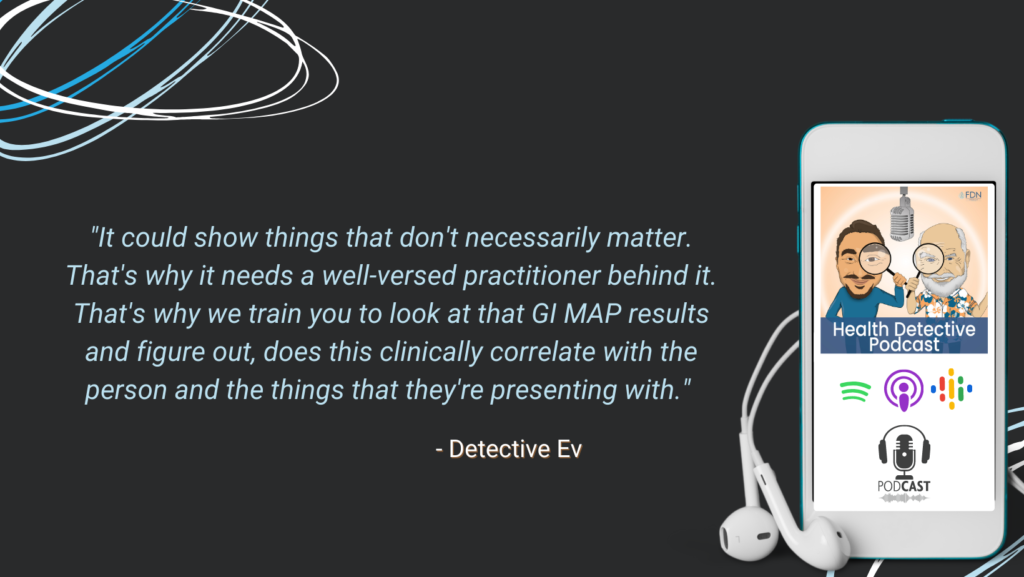
That’s a COVID situation, it’s not for this podcast. But if you’re thinking that, that is actually true. It could show things that don’t necessarily matter. That’s why it needs a well-versed practitioner behind it. That’s why we train you to look at that GI MAP results and figure out, does this clinically correlate with the person and the things that they’re presenting with. Because yes, you might find something on the GI MAP that is not important. But you might also find something that’s pretty important that no one else has been able to find.
I don’t want to say this totally matter of fact, but in a sense, it can be too good in certain ways. That’s why we actually train you to use this test. Because there’s plenty of practitioners, my God, it’s a little scary, I know you’ve seen this, Reed, that run the GI MAP, and they think everything that pops up on there is automatically something that you need to do something about. Worst case, that’s a doctor doing that, and they’re treating it with medication that has side effects when nothing really needed to be done.
So, a GI MAP is fantastic. We find a ton of stuff on there. I’m sure you want to add something to that.
Understanding Why Your Gut Flora Needs to Stay Balanced
[00:50:12] Reed Davis: Yeah. First of all, our guests on this Health Space Unmasked this Saturday is Dr. Tom Fabian from DSL. We’re going to do a in-depth dive into the GI MAP. By the way, they have some other labs that he’s going to talk about, mostly correlating it around this thing called the microbiome. The microbiome is much more diverse than we give her credit for sometimes.
Sometimes there are imbalances in the good to bad ratios, if you want, of these friendly versus sort of unfriendly flora. They’re supposed to be a certain amount of unfriendly because it keeps your immune system hovering for when something really bad comes along or when that sort of bad flora gets too high, a percentage of the total flora.
You get this dysbiosis and things. You need both. And man, today’s world is full of people who’ve got too much stress and their immune system goes down. Then what pops up? The bad bugs, sort of, gets out of balance.
Once it gets out of balance, now you get dysfunction, you get antigen penetration, you get all kinds of immune cloud PLEXUS floating around clogging up the liver, detoxification. But it just snowballs. There’s just all of this stuff going on. One thing we look for on this test are the bigger bugs that are actually dangerous pathology.
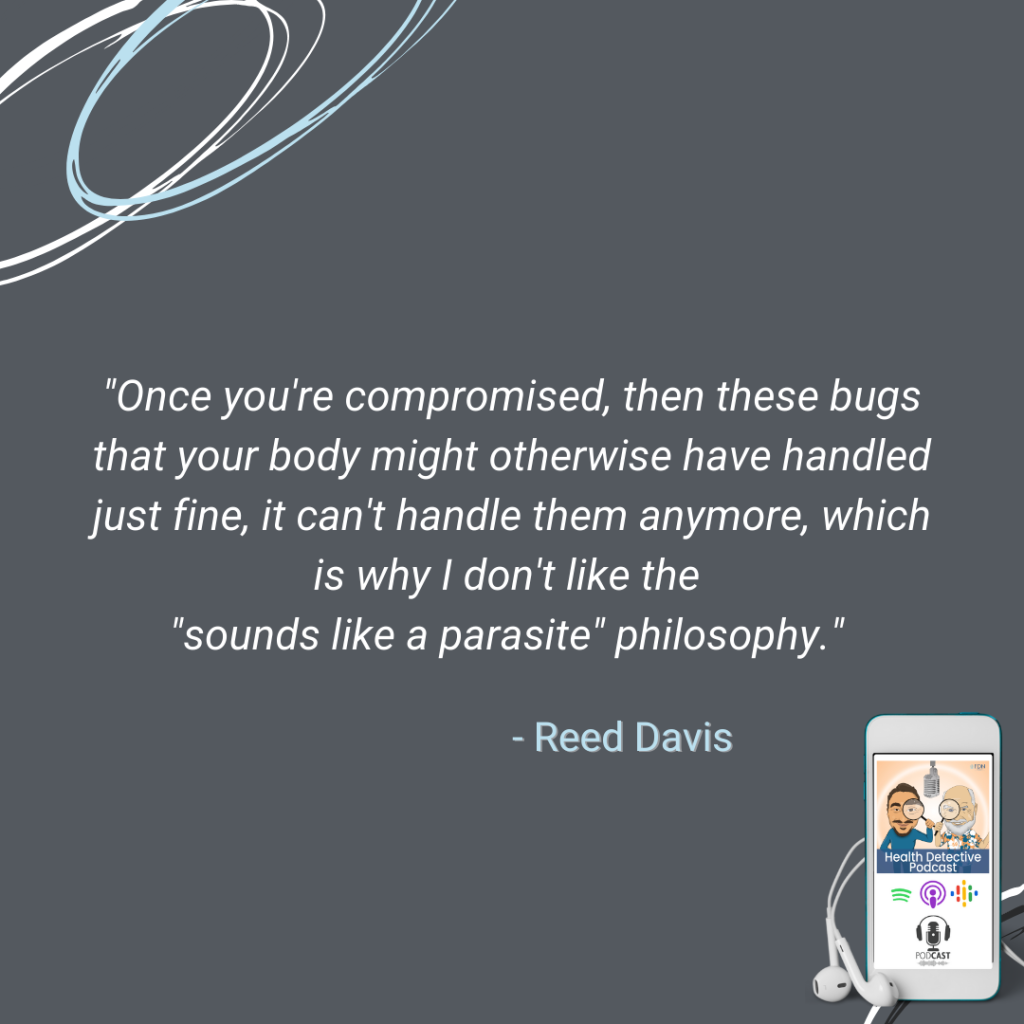
Once you get sick, then you can get sick, if you know what I mean. Like, only sick people get sick. The compromise is what we should probably say. Once you’re compromised, then these bugs that your body might otherwise have handled just fine, it can’t handle them anymore, which is why I don’t like the “sounds like a parasite” philosophy.
Healing Everything to Stay Healthy by Running All 5 Labs
You know, like you pick a test. Oh, it sounds like a parasite, let’s test. God forbid, you find one and you say that’s the person’s problem and treat it. You know, again, the diagnosis and treatment system doesn’t work for us.
You were compromised before you got sick. Again, the stress, the digestive problems, the detoxification problems, the immune problems, and these things all sort of add up to a snowball. That’s why the DSL needs to be carefully assessed in context with some other labs, like the Mucosal Barrier Assessment, like the Metabolic Wellness Panel.
You better be looking at the hormones too, with your SigA, you know. That’s why I say we don’t want to just take that as a diagnostic test and say, oh look, H pylori. Found your problem, let’s treat it. You can go ahead and chase away some H pylori and the person might, depending on how much the H. pylori was actually affecting the person – the level of contribution that that was making to their overall metabolic chaos, they’ll get better to that degree, and to that degree alone.
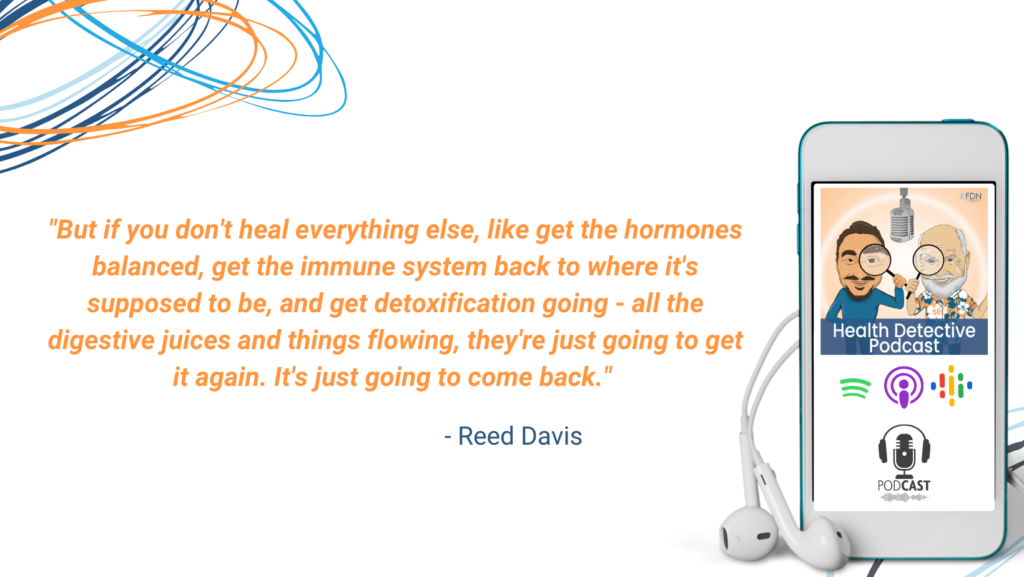
But if you don’t heal everything else, like get the hormones balanced, get the immune system back to where it’s supposed to be, and get detoxification going – all the digestive juices and things flowing, they’re just going to get it again. It’s just going to come back. That’s why, again, you find people who’ve been to six or eight or ten practitioners.
Changing the Lifestyle Stuff While Running All 5 Labs
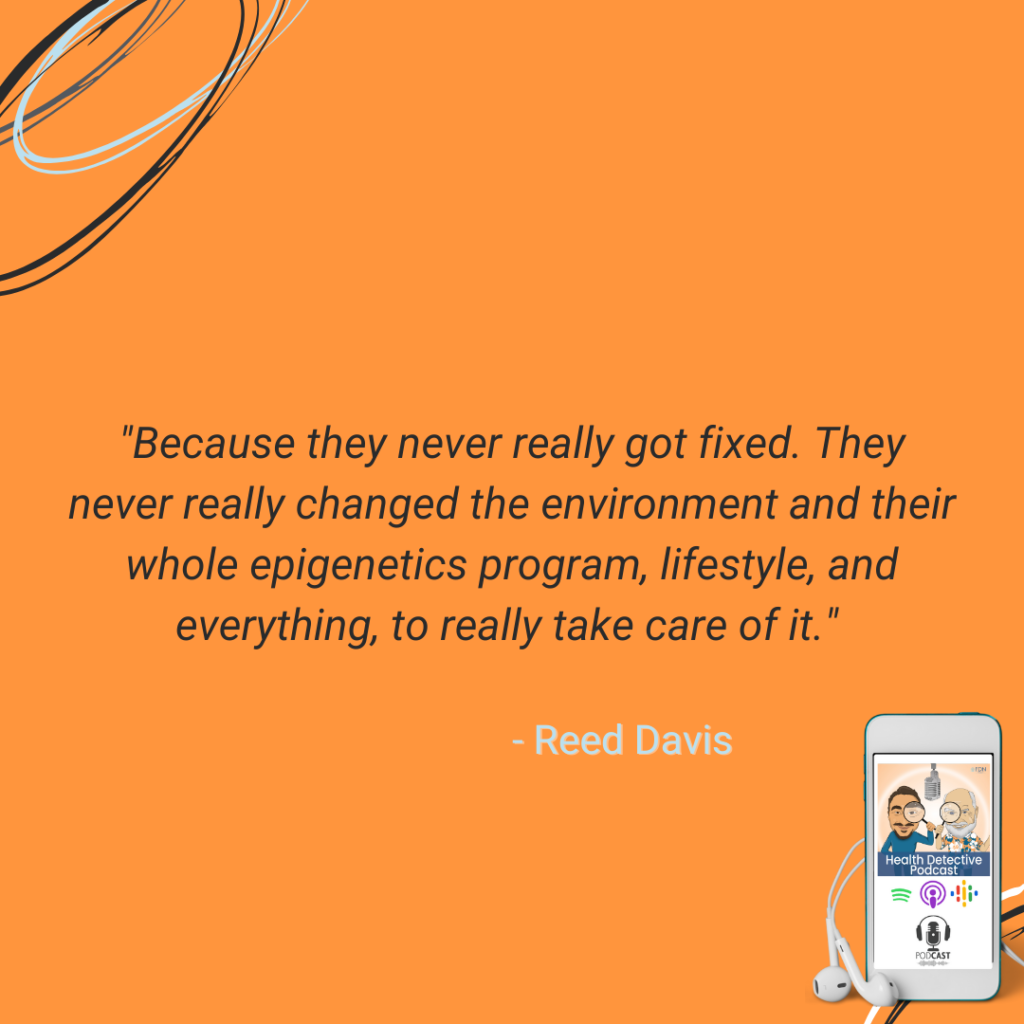
I’ve had people come in the office and they say, well, five years ago, I had this bug, but they cured it. Three years ago, now it’s two years later, this other bug showed up. And then two years after that this other bug showed up. And I’m going to find a new bug or maybe one of those repeating itself. Why? Because they never really got fixed. They never really changed the environment and their whole epigenetics program, lifestyle, and everything, to really take care of it.
With the DSL, you can make that mistake, greatest of tests as it is, it’s kinda too easy to point the finger at this or that. By the way, you mentioned it being a DNA by PCR test, and it is a good, very accurate test. But you know, it’s all done by machines except maybe the calibration of the machines.
I like some of the old-fashioned culturing and microscopy and trichrome staining and antigen testing and things we used to do, because a human was involved. You know, they were looking for bug park. Oh, look, I found one cell of this or that. So, there’s some real strong argument to be made for even the culturing that you mentioned, because a human’s looking at it and going, hmm, what’s that like?
These guys are lab rats. They live to identify the species of things. Then also the degree to which it is growing. The amount of fuzz growing in a Petri dish can be very helpful in designing a protocol for a person. And it’s easy to retest too.
So, I like some of the old testing as well as the DSL. But you’re right, DSLs considered state of the art now, testing.
Using the Metabolic Wellness Profile While Running All 5 Labs
[00:54:46] Detective Ev: Okay, cool. Reed, last but not least is the Fluids IQ, again. We really love that company. They’ve helped us out a ton. Just as you’ve said, continuously like standing up and just really helping out FDN. And I know that they’ve been very receptive to the things that you needed, because it’s kind of hard sometimes to find a lab that can do exactly what we need them to do. They are three out of the six tests that we use now. And it is called the Metabolic Wellness Profile.
Just to be clear for those listening, if you’re considering the course, nowadays in the cost of tuition we actually include five of those tests. It’s everything except the food sensitivity test. One of the reasons for that is just because it’s so different, depending on where you are in the world. It can be a little tricky. But yeah, the five things, you’re going to get that in the course of the cost of tuition.
Let’s break this one down, the Metabolic Wellness Profile. What is that for? Like what are we looking at there?
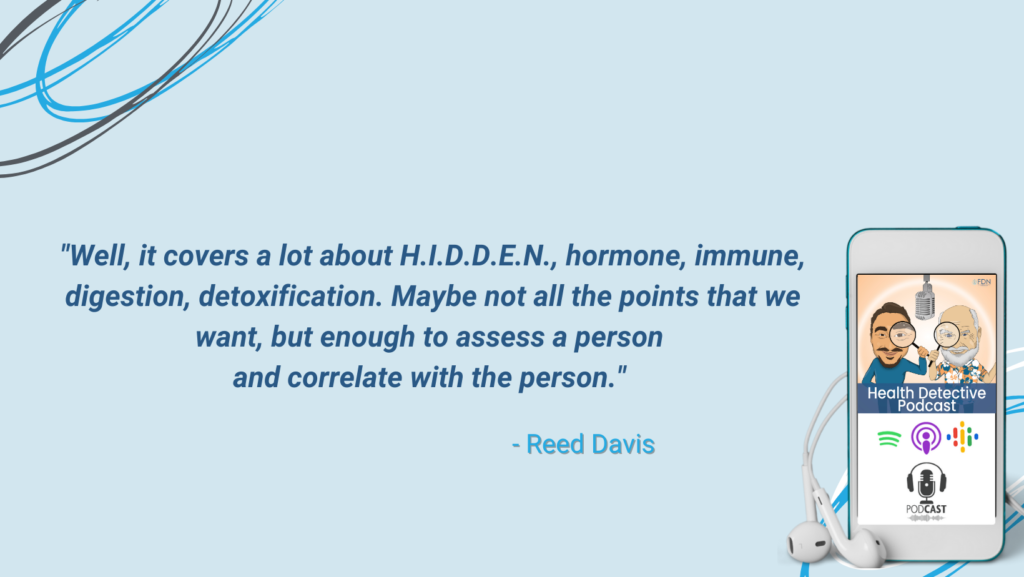
[00:55:37] Reed Davis: Well, it covers a lot about H.I.D.D.E.N., hormone, immune, digestion, detoxification. Maybe not all the points that we want, but enough to assess a person and correlate with the person. It does an awful lot of explaining about why they’re showing up so crappy, especially when they’ve been told by someone else there’s nothing wrong with you, your blood work looks normal.
Forming An Entire Epigenetic Program While Running All 5 Labs
Well, this isn’t that kind of blood work. Matter of fact, as you said, it’s a urine test. It’s very easy to collect at home. It’s not expensive. You basically pee on these bladder strips, then you wait until they dry, and you send them into the lab. There’s no shipping cost other than a little envelope, it’s really convenient.
It gives us the data we need to assess what you need to do to improve your health. Again, we’re not diagnosing or treating anything specifically like a doctor, we’re looking for this whole cluster, this whole constellation of healing opportunities.
By the way, you mentioned Fluids IQ. I have to take my hat off to them because not only are they a great lab, their science people are just real science-y, their lab rats are real ratty. You know I like to have fun doing these things.
Detective Ev: Only way to do it.
Reed Davis: Yeah, they’ve really got the tech down, but they also understand us as FDN’s. They understand that we’re not doctors. We don’t want to be diagnosing and treating one little thing, fractionating the body up into, well, I’m a gastroenterologist, I just look at this. Or that problem you have, oh, you got to go see an endocrinologist for that. Then that guy says, oh, I’m just an endocrinologist, you got to go see a neurologist for that.

No, we’re looking at this entire constellation, forming an entire epigenetic program. It’s everything you need to know about your diet, your rest, your exercise, stress reduction, supplementation. We’re looking at something that doesn’t treat anything specifically.
Assessing Digestion While Running All 5 Labs
It treats everything, every cell, tissue, organ, system simultaneously just with lifestyle. It’s amazing. They understand that. Fluids lab not only gets that, they appreciate it. They think we’re some of their smartest customers. Boy, if just everyone would do what you guys do, this would be a much healthier world.
So, Dr. Gonshor and his family that run it, and the other scientists that work there, Bob, and, you know, I’ve had these people to my house. They’re in Canada, I’m in Southern California. We definitely have worked together hard to put together all of these labs and to make them available. Now, I’ll answer your question.
The Metabolic Wellness Panel is three markers and we’re adding another one to it. That’s the other thing I love about Fluids, digressing once again. They’re willing to add labs for what I want. I want to know this about a person, I want to know that about a person, so I can help them heal overall. They’ve been willing to add markers to their labs.
By the way, it’s nice to be that strong and that substantial of an organization.
[00:58:36] Reed Davis: We’ve got some clout in that way, cause we’re doing a ton of testing, hundreds and hundreds of hundreds of labs every month. We’re a good customer of a number of labs, lab companies.
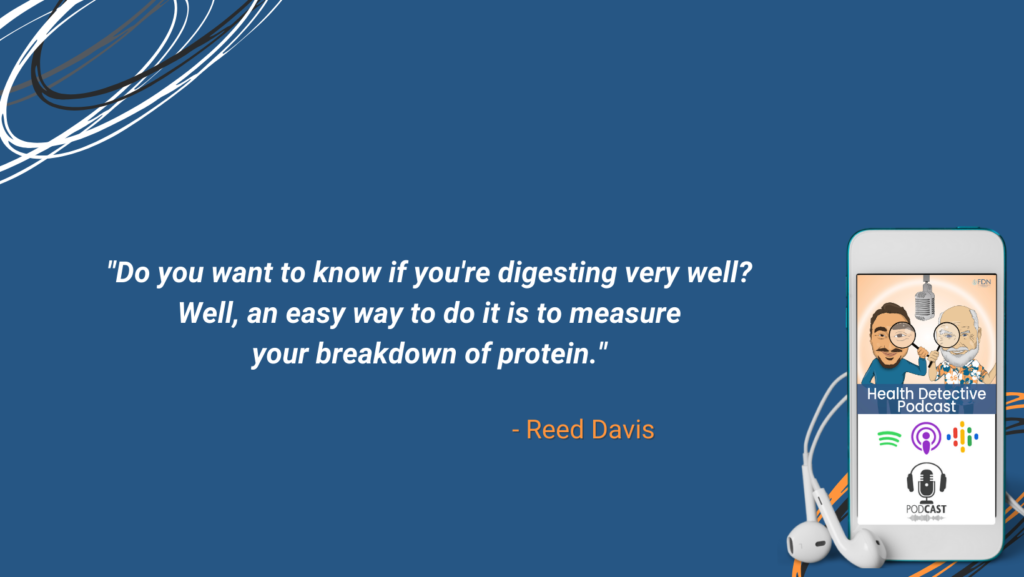
So, the Indican, Indican is a measurement of protein breakdown. Do you want to know if you’re digesting very well? Well, an easy way to do it is to measure your breakdown of protein.
Seeing Maldigestion, Malabsorption, & Dysbiosis While Running All 5 Labs
Indican, if it’s negative, you’re breaking down your protein. If it’s positive, well, to what degree is it positive is important. What it means is you don’t have the bacterial breakdown of protein. Remember protein, you chew it, you swallow, it goes to the stomach. Pepsin and hydrochloric acid have an effect upon it. It goes into the small intestine. And you want all those amino acids that are in protein to be broken down and properly absorbed in your body cause you need them, plenty of them, lots of them.

If that’s not happening, you’ve got, you could call it maldigestion, malabsorption. That’s important. You could also tell from that one marker that you do have a dysbiosis, remember, cause you don’t have enough of the good bacteria that breaks down that protein into the amino acids that way. So, now we know malabsorption, maldigestion.
Dysbiosis, that means your friendly bacteria is out of balance with the bad bacteria. That’s a whole lot of information about a person. We could go on from there to say, what does that tell you? Where’s that point the finger in terms of other dysfunction in the body? We could go there, and we go there in the training. It tells you a lot about a person.
Another marker on there is your Urinary Bile Acids. They tell you whether your liver’s congested. Not what a doctor would look at. Doctors look at do you have hepatitis, a liver disease? Do you have cirrhosis? These are advanced, downward spiraling, potentially very serious diseases. Your doctor’s there to tell you if you have that kind of pathology. What we’re talking about is strictly a functional marker.
Assessing Liver Health While Running All 5 Labs
That’s why we call it functional health coaching, really. Because it’s going to tell you, is your liver doing its job as a filter? Or is it congested? It’s really a good thing, actionable. You can take steps right away. It tells you what’s wrong with the person and explains a whole host of symptoms.
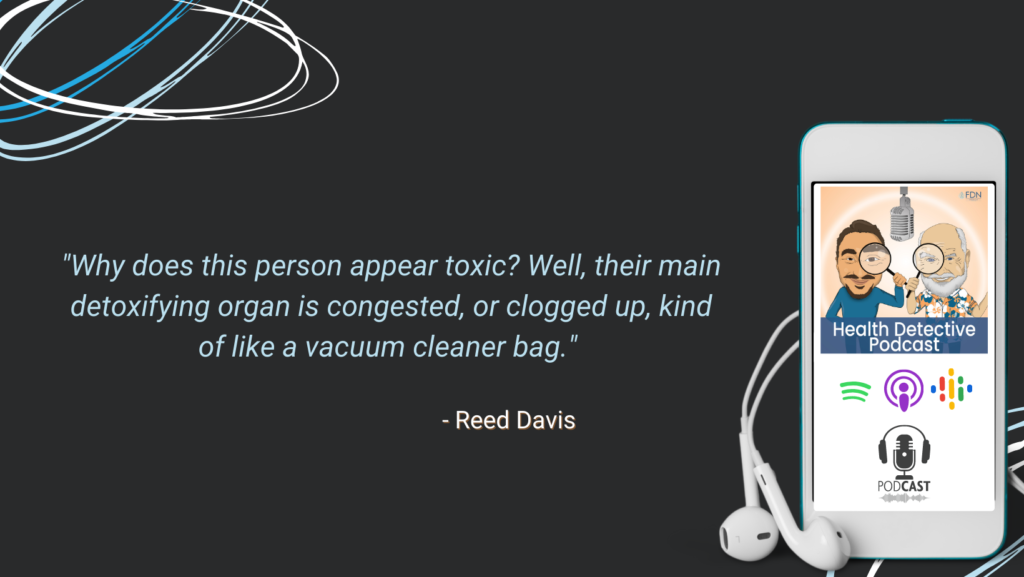
Why does this person appear toxic? Well, their main detoxifying organ is congested, or clogged up, kind of like a vacuum cleaner bag. Remember the old ones had bags? You probably don’t remember they had bags. The good ones.
[01:01:05] Detective Ev: I do remember when vacuums had bags.
[01:01:08] Reed Davis: Just teasing you.
But listen, I mean, you can’t buy a good vacuum cleaner anymore cause they took the bags out of them. So, this bag, when it got full, you’re vacuuming and it doesn’t work anymore, it won’t pick up little things on the carpet, right.? You take that bag out, you put a new bag in, and it works like a brand-new vacuum cleaner.
In that sense, the liver’s like the bag. It’s collecting toxins and immune complexes and all kinds of things out of what’s being absorbed into it. It clears about three pints of blood per minute, and a lot of it’s coming off your digestive system. It’s absolutely amazing what the liver does.
Wouldn’t you want to know if it’s congested, if it’s time to change the vacuum cleaner bag? Because otherwise, no, one’s looking. You know, your vacuum cleaner bag needs changing and no one’s looking at it cause it’s not showing up as a disease that a physician looks at yet. It’s a great healing opportunity for us.
Assessing Oxidative Stress While Running All 5 Labs
And last but not least on that test now, before we add a new marker to it, we have Indican, UBAs and then your oxidative stress marker, which is the 8-OHdG, used to be lipid peroxides. Now we look directly inside the cells for oxidative stress. It’s a normal part of life.
There’s always going to be some pro-oxidative elements in the environment and inside your body, you make them. Matter of fact, it helps the body to regenerate and breakdown and repair and rebuild and things like that. There’s pro-oxidation. Of course, we’ve all heard of antioxidants, antioxidants are what keep you from breaking down too fast.
It’s a direct measurement of how much oxidative stress the inside of your cells is under. If you have enough oxidative stress, it’s certainly actionable. You can use antioxidants; you can eat more antioxidant rich foods. You can change your lifestyle around quite a bit, so you aren’t rusting.
Oxidative stress could be looked at as if you leave a car out in the backyard for 10 years. What’s going to happen? It’s going to fall apart from rusting. If you just leave a nail out in the rain, it’s gonna rust, you know, that’s oxidative stress. You don’t want too much of it, you need some. But you want your pro-oxidation and anti-oxidation to be in balance.

So, it’s a measurement, allows us to assess a person’s oxidative stress. It’s critical because it’s actionable. Again, there’s no fluff in this course. There’s no extra stuff that you don’t need. You’re going to use every single thing we teach with every single client.
Helping Design a Self-Help Program by Running All 5 Labs
Now, not every marker is going to show up as a problem, but you’re going to, from our five labs that we just went over, you’re going to get this constellation of healing opportunities. On this lab, you got those two markers. On this lab, you got maybe one out of four markers, maybe all four out of four markers. On this other lab, this.
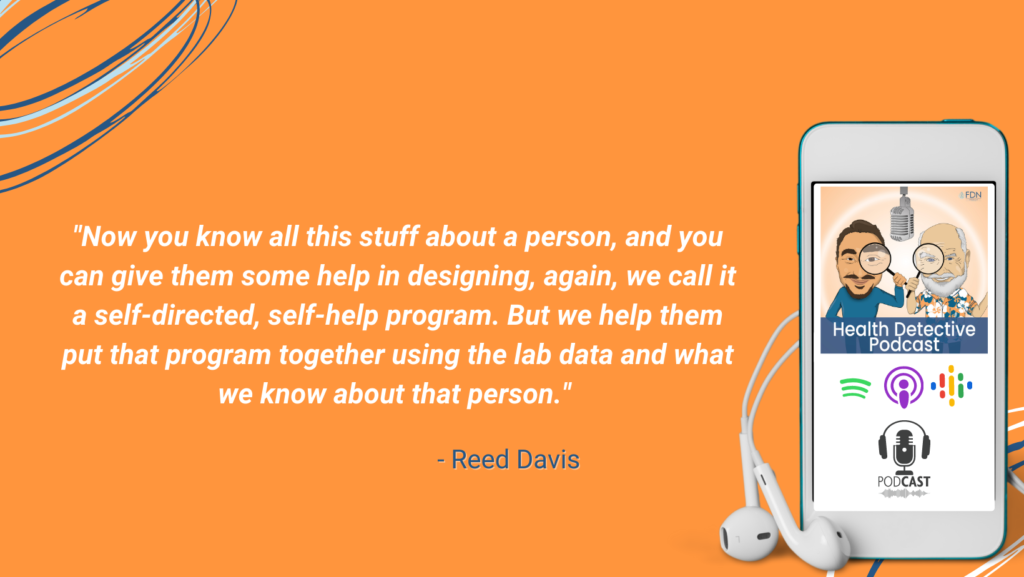
Now you know all this stuff about a person, and you can give them some help in designing, again, we call it a self-directed, self-help program. But we help them put that program together using the lab data and what we know about that person.
[01:04:16] Detective Ev: Wow. Well, you guys got a lot of stuff today. One thing I always think about with the oxidative stress marker (it was a different test at the time, but obviously we were still looking at the similar things), Jenn Malecha, man, it’s not diagnostic by any means, but if someone has a lot of oxidative stress, that’s kind of correlated sometimes with like a cancer type of thing. It can be other things as well. Jenn Malecha, I remember late twenties, early thirties when she ran this test, Reed. Remember she had skin cancer and her oxidative stress was super, super high.
Again, guys, it’s not diagnostic, that’s not why I’m saying it. It’s just interesting how much you can correlate with what the person is dealing with. Who knows what would have happened for Jenn if someone had ran that test four years before her diagnosis, right? This stuff’s not overnight, it’s building up over time and then leads to a disease state.
Focusing On the Lifestyle Stuff First While Running All 5 Labs
It’s really cool what this can all do. This was quite a bit, we covered all the different labs, we covered H.I.D.D.E.N. We didn’t even really fully get to cover D.R.E.S.S. We did mention it at one point in the beginning here. And I have a whole episode on that. I’ll keep it brief for you guys. It’s diet, rest, exercise, stress reduction, and supplementation.
That is actually the core of what we do overall, that’s the lifestyle stuff. That’s the really important things. You can run the fanciest labs; you can buy the nicest supplements. If this person that you’re working with is still going to stay up on night shift and only sleep for four hours a day, good luck. Right? You’re only going to be able to help them so much.

We got to focus on the lifestyle stuff first. The lack of it, is what got them in this mess to begin with. But once they’re in that mess, there’s things that we need to use the tests for, to figure out, all right, how do we mix the lifestyle stuff in with these protocols to get this person back to where they need to be?
I was someone, Reed, who was doing a lot of great lifestyle stuff, better than most 21-year-olds, that’s for sure. I wasn’t going out and binge drinking or staying up at the bar, yet I was still sick. That’s why I needed those lab tests because years of ignoring the D.R.E.S.S. type of things, the lifestyle things, led me to that situation.
Respecting Clients’ Lab Data While Running All 5 Labs
[01:06:03] Reed Davis: Well, that’s good you weren’t out there doing those things, and yet you still had issues and problems, and that’s the whole point. I don’t know if we want to do this on a different podcast or now, it’s a bit lengthy. But I want to at least give a nod to the fact that, well, how can health coaches run these labs? Because we get asked that a lot, a common question. Hey, you’re just a health coach, how can you look at labs?
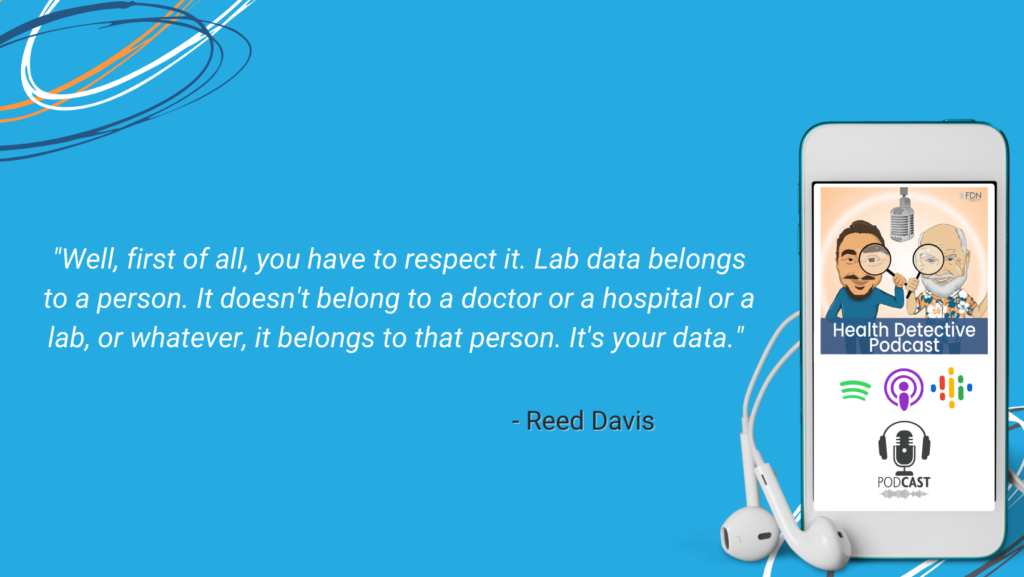
Well, first of all, you have to respect it. Lab data belongs to a person. It doesn’t belong to a doctor or a hospital or a lab, or whatever, it belongs to that person. It’s your data. There ought to be this freedom around that data. It’s my data, can I just please look at it?
Now, what about knowing what it means? Not the diagnosis. What does it really mean to me as a person? It’s my data. What does that marker mean? Does it tell me I should be doing something? Is it preventative in any ways? Is it anti-aging in any ways? The answer to all those questions is yes.
It’s very, very helpful data when you just look at it as data. So, labs come up with this data, that’s why we have good labs. They get your blood, your saliva, your urine, your stool, your hair, your skin. There’s lots of ways that a lab can assess things.
Connecting the Dots While Running All 5 Labs
These guys working there, they’re not doctors either. They’re very scientific and they’re cool people who have a love for the science of what they do. They want to help people too. They want this data to go out into the world and help people. Unfortunately, I’ll say for some people, that data gets in the hands of someone who is trained to just diagnosis and treat one. They’re going to take a very limited and narrow view of that data. If they don’t see a diagnosis in there, they’re going to just ignore it. It’s all in range, except for that one. Oh, that’s your problem, there it is.

We look at all the data. We know about reference ranges too, but we’re going to not just look at one dot. We’re going to connect all the dots and say, here’s all the things going on. And guess what? It perfectly explains why you’re showing up the way you are. Then you’ll want to take action based on that data. So, there’s no medical diagnosis, that can only be given by someone with a medical license.
They can give a medical diagnosis. Is that what you want? You want another diagnosis?
[01:08:28] Detective Ev: What does that even do? All the diagnosis does, it kind of tells you what’s going on in a sense, but really what it does is just allow us to prescribe a medication. Obviously, as FDNs, we can’t do that unless you are a doctor in FDN, which some people are. I’m not. I can’t do that, and I don’t want to do that. Because for people like me, when I got prescribed the medication, usually it led to side effects. Sometimes it didn’t even work. There’s a time and place for medication, no doubt.
Using a Complete Form of Care by Running All 5 Labs
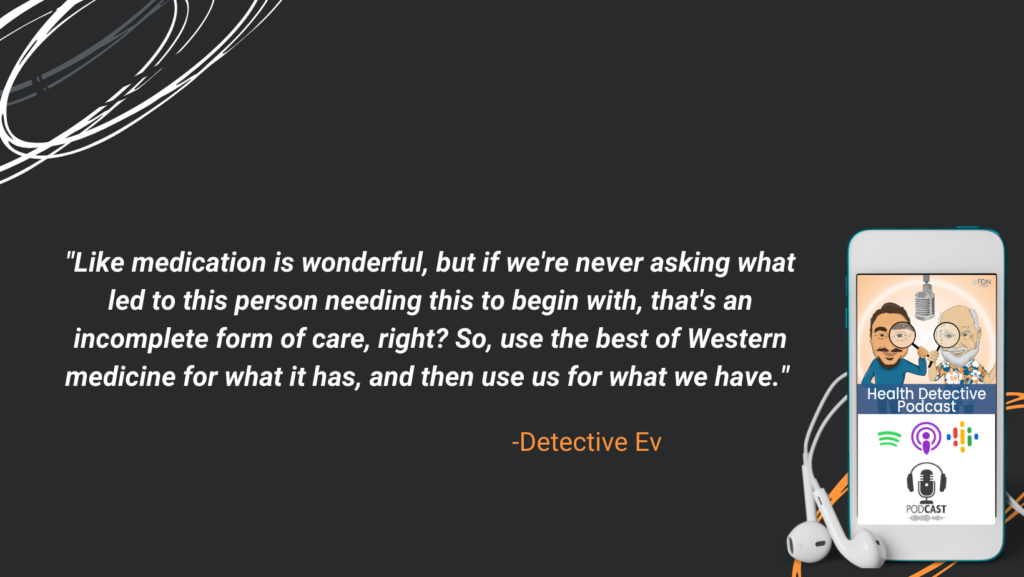
You refer to these things sometimes as like a life vest, right? We got to keep the person afloat, especially depending on how sick they are. Like medication is wonderful, but if we’re never asking what led to this person needing this to begin with, that’s an incomplete form of care, right? So, use the best of Western medicine for what it has, and then use us for what we have.
And I love what you said, like a lot of these lab people are not even doctors. I don’t think many people realize that, Reed. I didn’t realize that beforehand. When I was finding out about FDN, it was hard for me to grab the idea that I can use these labs.
And we have an episode, guys, that just came out a few weeks ago, Dr. Sandeep Gupta. He’s one of our medical directors, we’ve been trying to get him on forever. Finally, we were able to sneak something in. He is one of the people that allows us to facilitate these lab orders through him. He talks to you all about it at the end. Go skip to like the 40-minute mark, about how we’re able to do this, why he trusts FDN enough for him to put his name on this. Understand, this is about as by the book as it can get.
You were in law before FDN, right? You’ve had other things before FDN, correct?
[01:09:53] Reed Davis: Yeah, sure. I was saving the planet in environmental and conservation area. I was an environmental law paralegal, still am technically. But you know, out there saving the planet and all of a sudden, I realized, well, what about people? What about people, including me? I didn’t want anything sneaking up on me.
Doing Things by the Book & Getting it Done in FDN
Long story short, I went to work in a clinic, ran thousands of labs on thousands of people. Had great mentorship, made my own observations, recognized patterns, created a system that all of our patients could go through. All of our patients and my clients could go through this H.I.D.D.E.N. And then the D.R.E.S.S. for Success protocols. After 10 years, someone talked me into teaching. You should be teaching others. The rest is history. You know, we’ve now deputized thousands of people around the world to do FDN. But it was started with one clinic, one guy just trying to help people.

[01:10:44] Detective Ev: Bam. It’s the perfect mix. Right? You got a guy with an entrepreneurial background, some mixes of the law stuff, and then 20 plus years of doing the health thing. It makes for a good combination. I’m just saying, it’s actually interesting. We’re doing things by the book. We’re getting it done.
Don’t worry about the lab thing, that’s been going on for years and there’s never been a problem at all. Right? The only problem could ever come from a practitioner doing the wrong thing that they were not trained on. And thankfully, we’re sending good people out into the world doing this. No issues whatsoever.
Using Western Medicine When Needed & FDN When Needed
[01:11:10] Reed Davis: I just have to add to that, and I know we want to conclude and wrap it up here, that if you get off a plane from West Africa and your temperatures at a 105, and you’re bleeding from your eyeballs, you’re not going to call your nutritionist, who’s trained in FDN. You’re going to go right where you need to go.
If you get in a car accident, if you get wounded in a drive by shooting, you know, all those things, you go and you get that taken care of. That’s what doctors are so amazing at, saving lives. So, when the downward spiral towards death is really contracted, you go get a doctor to get the life preserver on you and get you out of the woods. You know?
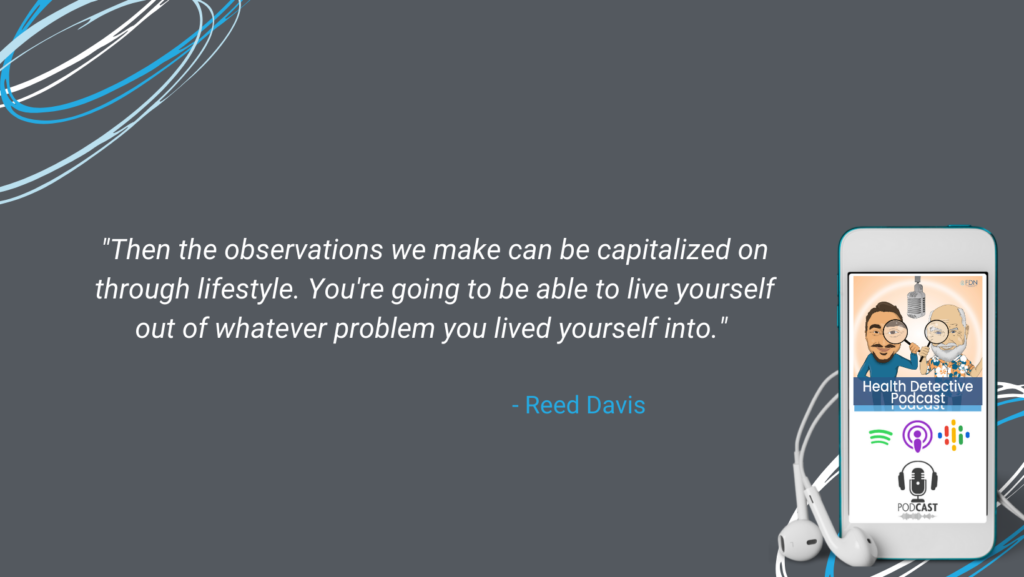
Then the observations we make can be capitalized on through lifestyle. You’re going to be able to live yourself out of whatever problem you lived yourself into.
[01:11:59] Detective Ev: Bam. Yeah, I think that’s worth mentioning. I always try to on the show really emphasize that we work more synergistically with Western medicine than probably most places out there.
It’s unfortunate. Right? A lot of natural and functional people start getting a little cuckoo on the other end. They’re like, oh, forget Western medicine. I’m like, well, I’m not going to forget that when something bad happens to me, you know what I mean? I got accidents that happened in life, that’s just a thing, which makes the best of both worlds.
Being the Perfect Complement by Running All 5 Labs
[01:12:23] Reed Davis: Yeah. In the past traumas and things, I mean, I go and get stem cells. Well, there’s no nutritionist that’s doing stem cells. You know, you have to go see a trained orthopedist or someone who’s now made that their modality. Because I want to heal the tissue inside my neck, that I damaged very badly surfing, and wrestling, and playing football, and riding motorcycles and all the built-up stuff.
My neck. I’ve had both shoulders done, my left knee, my mid-back with very advanced medical stuff. That again, I’m not going to a nutritionist for any of that stuff. We’re going to go to a trained physician who’s licensed to diagnose the disc space and the arthritis and the pinched nerves and all this stuff.

I mean, it’s a wonderful, actually a good, it’s integrative. It’s very complimentary. Matter of fact, we think we’re the perfect complement to anything else you have going on.
[01:13:16] Detective Ev: I’ve seen that to be true over five years, it’s not just a cute statement. I mean, it’s actually quite legitimate.
Reed, man, thank you so much for coming on. Again, this was so much different than episode 100. I hope people end up listening to that too, to hear some more stories and testimonials. But we broke things down today, man. I don’t know what else you’d want if you’re listening. So, thank you so much.
Reed Davis: We’re good.
Detective Ev: Okay. That’ll do it for today’s episode.
Conclusion
I think that might be the longest for a singular episode on here. I could be wrong. I mean, of course, we’ve had multiple part episodes, but I’m just talking about one release. This might take the cake. And of course, if someone’s going to take the cake, it’s going to be Evan and Reed. We got plenty to say that’s for sure.
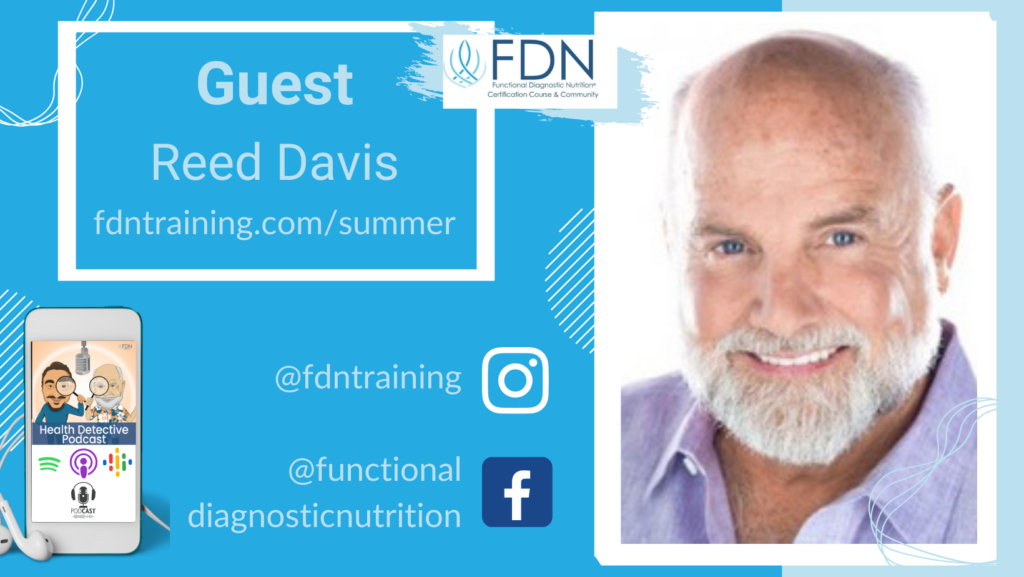
I don’t want to take up any more of your time. Thank you, guys, so much for listening. And if you’re interested in that Summer Open House, seeing the schedule, or signing up for notifications, don’t forget to visit fdntraining.com/summer.
And hey, if you like the content that we are sharing and are feeling extra generous today, please go to Apple and or Spotify and leave us a five-star review. If you would be so kind as to do that, we would love you even more than we already do.
I’m looking forward to coming back to you with another episode. But until then, take care.

